What is a Reedie?







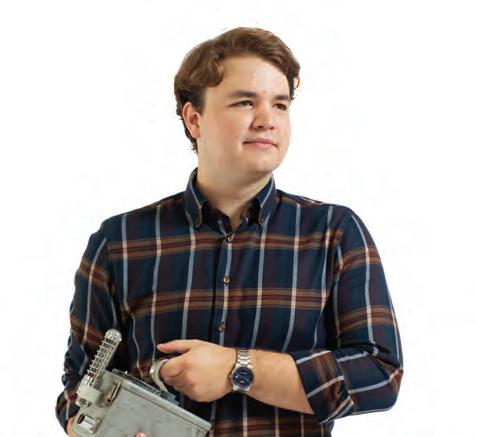

















Thanks to our incredible donor community, Reed was able to use flexible funding over the course of our most recent fiscal year to meet emergent needs, provide more financial aid than ever before, and continue— as always—to support a transformative education for every Reedie.
Reed supporters enrich students’ lives at every turn. Thank you.
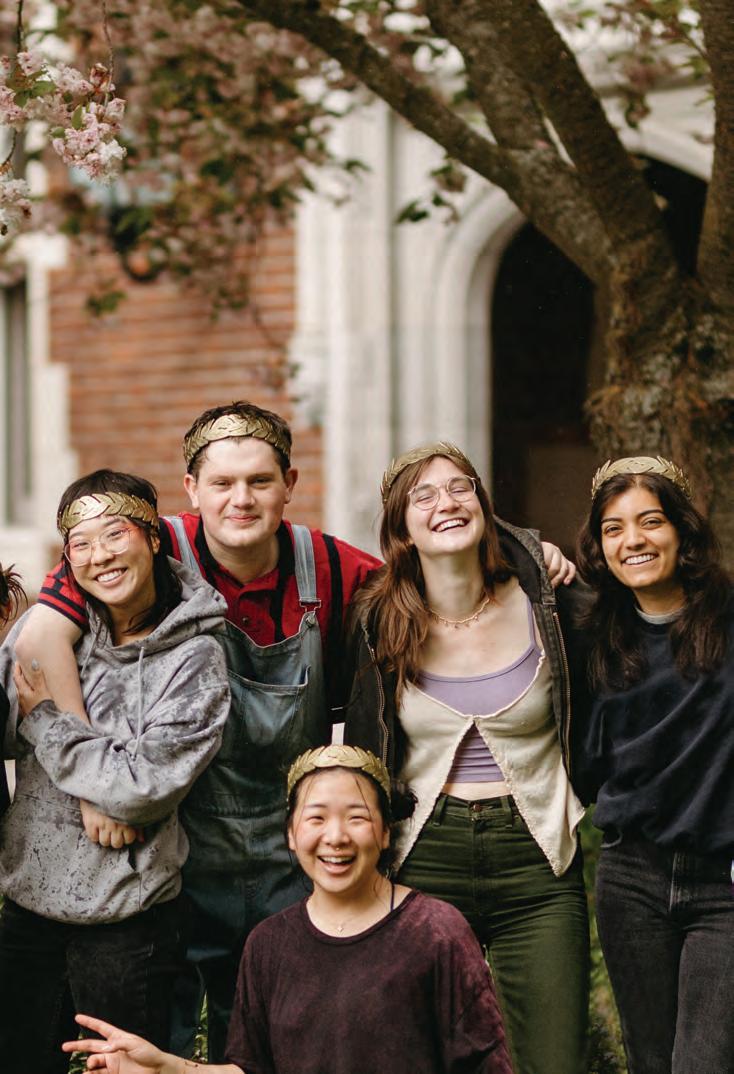
“I have had a great time at Reed meeting new people, making friends, and exploring my interests. I don’t know what my life would have been like at another school, but I cannot imagine it being any better than this.”
“My time at Reed so far has been amazing—the intellectually stimulating environment combined with a tight-knit community is what makes Reed different. My professors believe in me more than I believe in myself and that gives me the confidence to try new things.”
“Your generosity is a part of my life every day. I love Reed and cherish being able to attend, so thank you for making Reed possible for me.”
GAVIN FLING ’25 MUSKAN JHA ’23 AMELIA SCHAEFFER ’23An online database was supposed to make college more transparent. Instead, Reed students found, it’s sowing confusion.
BY MEGAN BURBANKProud graduates of the Class of ’22 talk about their time at Reed and reveal their plans for what’s next.
NEWS FROM THE C AMPUS Donors help Reed students succeed in the new normal. Change Agents.

Reed Welcomes New Vice President and Dean for Institutional Diversity. Newly Tenured Faculty Bring Ideas and Innovation to Reed.
Griffin
THINGS AL UMNI Letter from the President of the Alumni Board. New faces on the Alumni Board.
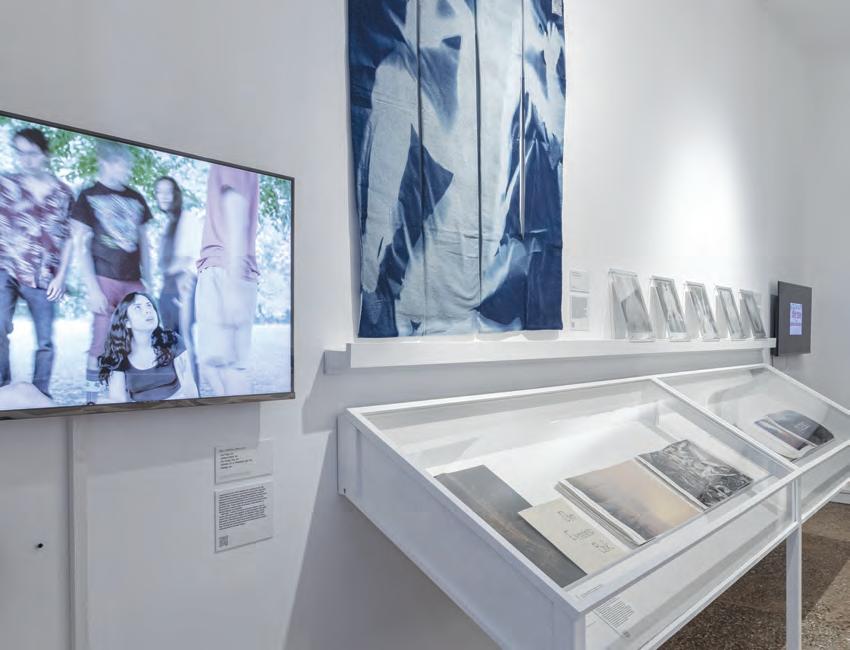
BOOKS, FILMS, AND MUSIC B Y REEDIES The Quiet Before: On the Unexpected Origins of Radical Ideas by Gal Beckerman ’98. Project Escape: Lessons for an Unscripted Life by Lucinda Jackson ’73.
In
HONORING CLA SSMATES, PROFESSORS, AND FRIENDS WHO HAVE DIED Novelist Plots a Life of Adventures, Sally Watson ’50. Personable Wines and Rare Manuscripts, Sean Thackrey ’63.
Rankings and scorecards and ratings, oh my! For students trying to choose the right col lege, the so-called college guides can disori ent rather than offer direction, and doubts sown in the media about the value of high er education can be discouraging.
In the late 1970s, when I told my par ents that I was going to major in philoso phy, they asked the question that almost always follows a student’s declaration of their major, “What are you going to do with that?” They wanted to know that my future would be secure, and their concerns were understandable.
At the time, I honestly did not know where my degree would lead; however, I did know that philosophy was expanding my capacity to think and to write—and I enjoyed it. As a passionate reader, I welcomed the challenges that philosophical texts posed. As a first-generation college student, I also saw paths opening up before me that inspired my curiosity, and I was eager to explore.
The study conducted by our Reed math students, featured in this issue, right ly questions the idea that the measure of student success and the value of a college diploma can be reduced solely to a paycheck. Although I recognize that making a living monetarily matters, a broad-based liberal
arts education provides an abundance of resources that can lead to a richly reward ing life, and a paycheck.
Our Center for Life Beyond Reed (CLBR) helps students imagine their futures and see possible pathways that will make the most of their highly individualized and multidimensional educational experiences. With an emphasis on purpose, the CLBR focus es not so much on the what (what are you going to do with that?) as on the why (why do you care about this?).
As the profiles of some of our most recent graduates abundantly illustrate, Reedies love learning. That love of learning—call it intel lectual curiosity, rigor, or idealism—is the energy that can provide sustenance when times are hard, and provide motivation to grow and develop.
Over my decades of work in higher edu cation, my belief in the value of learning and my experiences with talented students in and out of the classroom inspire me and give me a sense of purpose. I hope you find inspiration in these pages.
Bilger President of Reedwww.reed.edu/reed magazine reed.magazine@reed.edu
3203 SE Woodstock Boulevard, Portland, Oregon 97202 503/777-7591
Volume 101, No.3
REED MAGAZINE
editor
Katie Pelletier ’03 503/777-7727 pelletic@reed.edu
writer/In Memoriam editor Randall S. Barton 503/517-5544 bartonr@reed.edu art director Tom Humphrey tom.humphrey@reed.edu
class notes editor
Joanne Hossack ’82 joanne@reed.edu
Reediana editor Robin Tovey ’97 reed.magazine@reed.edu
grammatical kapeLlmeister Virginia O. Hancock ’62
REED COLLEGE RELATIONS
vice president, college relations Hugh Porter
INterim director, communications & public affairs Aimee Sisco
Reed College is an institution of higher education in the liberal arts and sciences devoted to the intrinsic value of intellectual pursuit and governed by the highest standards of scholarly practice, critical thought, and creativity.

Reed Magazine provides news of interest to the Reed community. Views expressed in the magazine belong to their authors and do not necessarily represent officers, trustees, faculty, alumni, students, administrators, or anyone else at Reed, all of whom are eminently capable of articulating their own beliefs.
Reed Magazine (ISSN 0895-8564) is published quarterly by the Office of Public Affairs at Reed College. Periodicals postage paid at Portland, Oregon.
Postmaster: Send address changes to Reed Magazine 3203 SE Woodstock Blvd, Portland OR 97202-8138
Write to us! We love getting mail from readers. Letters should be about Reed (and its alumni) or Reed Magazine (and its contents) and run no more than 300 words; subsequent replies may run only half the length of their pre decessors. Our decision to print a letter does not imply any endorsement. Letters are subject to editing. (Beware the editor’s hatchet.) For contact information, look to your left.
Chris Lydgate ’90 has rocket-powered Reed Magazine in transformative ways. Damned fine job. Shame to lose him but looks like the crew is ready to take the enterprise forward boldly.
Steve Lindsay ’81I very much enjoyed the descriptions of Hum 211/212 and wish I could have taken such a course. The section on cultural encounters by Prof. Dana Katz [art history] and Prof. Michael Breen [history] on those between Native Americans and Europeans did not mention, perhaps for lack of space, the important, but not generally known, influence of indigenous social arrangements on the development of notions of equality and liberty by the philos ophes. The free lifestyle and relative egalitarian ism of Algonkian speakers, introduced to the French philosophes by the widely disseminated writings of French missionaries to Canada, such as Brother Gabriel Sagard, had a major influ ence on the developments of concepts of lib erty. Locke and Voltaire credited his accounts in their writings, and Native American views/ criticisms of European culture were advanced in novels and plays, especially in France. This important Native American contribution to European thought is well developed in Graeber and Wengrow’s The Dawn of Everything: A New history of Humanity.
Bob Erickson ’60Tucson, Arizona
My experience in the Humanities One course was the best example of the small-size-confer ence method of teaching. Our wonderful teacher, Dorothy Johansen ’33 [history 1934–84], called us all her little cabbages: empty heads to be filled. I turned in my first paper in her fresh man Humanities One class after reading The Peloponnesian War by Thucydides. I reread the book
carefully and prepared a lengthy paper detailing all the information I found leading up to the war.
The note on my returned paper was: “I asked for the factors leading to the war, not the facts.”
It was then that I became a Reed student. (My roommate and remaining good friend, Harry Jacob ’54, recalls the comment on the paper I shared with him.)
Before completing my 120-page thesis on the federal government’s cost benefit analysis of hydroelectric projects, I tossed it away and went to Alaska for the summer.
Fifty years later I returned to Reed part time to write a new thesis; this was “Principal Agent Theory: Case Study of the Presidio Trust.” The Presidio Trust was an agency newly created to manage the national park following the depar ture of the US Army from the former army base in San Francisco, where I grew up. Writing this was a fun and rewarding effort. I learned that persistent effort by combined groups can effect change. Two years later, with the Sierra Club, the Presidio Historical Society, and neighborhood groups, I helped overcome the resistance of the Presidio Trust to tearing down two nonhis toric wings of an anchor-shaped building built in the 1930s to house merchant marines. The Merchant Marine building stands today as one of the entrances to the national park.
My thesis was accepted, and I graduated in 2005, Phi Beta Kappa!
Don Green ’54/’04 San Rafael, California
Thanks are due, I suppose, to the departing Chris Lydgate ‘90 for his attempt to “explain” the Reed endowment, which evidently works, and matters, pretty much like any other endow ment. However, he failed to address the critical issue of Reed’s investment criteria, and whether the goal of earning 8% is more important than using Reed’s $700 million to advance the social, environmental, and equity principles promoted in the rest of the magazine.
Claire Gorfinkel’66 Altadena, California
Mike Munk ’56 was the self-appointed politi cal conscience of Reed for all of the years that I knew him, starting in 1955, when I was a fresh man and he was a few years ahead of me. It was from him that I first heard of Professor Stanley Moore’s [philosophy 1948–54] dismissal (with loss of tenure—for which Reed was censured by professional organizations) and what Mike viewed as the college’s abject surrender to one of the red-baiting congressional committees that set the stage for Senator Joe McCarthy’s later (and subsequently better-remembered) assault on what is now called “Our Democracy.”
I recall that I met Mike for the first time at the annual celebration of the 1905 Russian Revolution, held that year on a student house boat moored in Sellwood, where my cousin by marriage (too complicated to explain!), Jonathan Ezekiel, and his girlfriend, Karen Kals Ezekiel ’56, also lived on a houseboat. Fragments of songs that I heard for the first time at that party lodged permanently in my mind: “When I went shootin’ with Rasputin in the palace of the Czars,” and “Enter the palace, kill the czarina,” etc.…
Mike and I maintained a casual friendship over the years at Reed, and later in New York, where we came across one another repeatedly. I also followed with interest and admiration Mike’s dogged persistence regarding the Stanley Moore case over the decades, as well as his support for many other just causes.
From almost my first day at Reed, I’ve been hearing laments about the extinction of its last, great generation of outspoken, radical thinkers and actors. Now, with Mike Munk’s passing, I suppose I could join that chorus, but I’m not inclined to do so.
 William Bernhardt ’60 Staten Island, New York
William Bernhardt ’60 Staten Island, New York

Psychology students Emerson Schimmel ’24 , Lena Kassin ’24 , Andries Castellano ’25, Tony Shan ’23 , and Clarissa Madar ’23 spent the summer exploring the relation ship between language and thought in research projects they undertook with psychology faculty Prof. Kevin Holmes and Enriqueta CansecoGonzalez. The students’ individu al (and in some cases collaborative) projects included studying people’s impressions of their “inner voice”; examining how words support
emotion regulation; and investigat ing how grammar shapes judgments about math ability.
Here Prof. Holmes, Emerson, Lena, and Andries discuss a language phe nomenon known as the bouba-kiki effect—when shown a spiky shape and a round shape and asked which one is a “bouba” and which one is a “kiki,” people from diverse cultures and languages uniformly say the round one is a bouba and the spiky one is a kiki, illustrating the existence of sound symbolism in language.
Nearly 5,000 alumni, parents, staff, and friends mobilized to support Reed, giving over $4.8 million to the Annual Fund this past year, ensuring the college could stay true to its mission, even as it navigated stubborn ly uncertain times.
“We’re impressed (but not surprised) at how our alumni community has stepped up to help current students,” says Alumni Fundraising for Reed cochair Cori Savaiano ’11
The Annual Fund supports Reed’s academ ic program and student experience—every thing from scientific equipment in the labs to books and journals in the library to financial aid. Last year, the college awarded a record $38.2 million in financial aid, a 25% increase from the previous year. Reed is one of only a few colleges to meet 100% of demonstrated financial need for all four years of a student’s education. A commitment of this kind, espe cially during the ongoing tumult caused by the pandemic, is only possible with the extraordi nary commitment of Reed donors.
“It might be a little cliché,” says Kyndra Kennedy ’04, “but the fact remains that when everybody chips in a little bit, it adds up to having a big impact on the college we love.”
In addition to gifts to the Annual Fund, alumni, parents, staff, and friends made sig nificant contributions to the general endow ment and created permanent funds in support of the financial aid program, the Calligraphy Initiative, the Center for Life Beyond Reed, the Center for Teaching and Learning, stu dent research, and the data sciences program, among other initiatives.
Loline Hathaway ’59 established a Student Emergency Fund endowment. “I had an emergency when I was a student,” she said. “Money was really tight and I don’t know how I got through it. So I have empa thy for somebody that gets sick or has to go home. That could happen to anybody and 18-year-olds don’t tend to have emergency funds. I thought, ‘That’s something I can do.’’’
With financial support at all levels, donors helped the community to navigate a new nor mal last year while continuing to make bold plans for the college’s future. Come what may.
 —MATT KELLY
—MATT KELLY
Like any Reed professor, Prof. Geraldine Ondrizek [art 1994] is a teacher-scholar. So, when the European Cultural Centre (ECC), an international cultural exchange promot ing contemporary art, approached Ondrizek about exhibiting her artwork in a biennial exhibition, she countered: exhibit her artwork, along with the work of her former students.
The exhibit, titled Transitions and Transformations: The Constant Flux of Our Personal Structures, explores how environ mental factors, such as climate change, envi ronmental degradation, and social-political factors—such as forced immigration, home lessness, and political instability—impact all living organisms biologically and genetical ly. “These works show not only difficult sit uations, but emphasize the metamorphosis and the resilience of living organisms and ecosystems,” Ondrizek writes in the exhi bition catalog.
The artworks of Reed’s art alumni would be perfect candidates to exhibit, Ondrizek thought. “I encourage them to make work that has social, political, and personal mean ing,” she says. She calls her recent students “change agents” who often combine their artis tic practice with activism, social justice, and political engagement.
Ondrizek was successful. The exhibit, which opened on April 23 and runs con currently with the famed Venice Biennale, showcases the artwork of Ondrizek, Visiting Professor Barbara Tetenbaum [art], and eight Reed alumni.

The exhibit emphasizes the long-held abil ity for fine art to be a mechanism for political and social activism. Ondrizek’s art explores the first 100 hours of in vitro fertilization via artist books made of bamboo paper and silk binding, as well as silk panels and a film. The exhibit of Stephanie Gervais ’09, Badr, tells the story of a South Sudanese man living in a refugee camp with a quilt embroidered with Arabic writing telling his story, com bined with a sound recording of him speaking. Photo transfers, accented with gold leaf, por tray the gender transition of M. Prull’s ’19 Films showcase alumni artwork that could not be on-site, including the large banners by Paulina Joy Poleyumptewa ’21 , dis played in Portland, Oregon, in spring 2021, exploring the concept of Indigenous identi ty and criticizing colonialism, and five films, the genres of which including documenta ry, telenovela, and drama, made by home less youth and produced by Nili Yosha ’07 that portray daily life of homeless youth in
Portland.Yosha is the executive director of Outside the Frame, a Portland-based non profit that teaches homeless youth photog raphy and documentary film skills. Ondrizek “could have had the whole gallery to herself,” Yosha said. “But she invited her students to participate with her. I, in turn, presented my students’ work.” An artist herself, she said her students’ films are “the best of my work.”
Transitions and Transformations is a com plex and nontraditional show, but the exhib it’s design mimics the artwork’s themes, which reveal that “we are extraordinarily vul nerable,” Ondrizek said. “We have to real ize that transformation is going to happen, whether we like it or not.”
While the ECC curator Lucia Pedrana’s selection of Ondrizek’s work was a driv ing force of the exhibit, numerous ties to the Reed community made it possible. Paid with grants and sponsorships, including the Oregon Arts Commission and the Ford fam ily Foundation, the exhibit was additionally funded by Norman Packard ’76 and his wife, Grazia Peduzi, who contributed to sponsor three artists in the show who exhibit through their nonprofit, The Emergent Art Space. Transformations and Transitions is the sixth edition of “Personal Structures,” which the
ECC organizes biennially. The exhibit runs concurrently with the Venice Biennale, the world’s largest international and most pres tigious art exhibit . This Biennale is historic: for the first time in history, a woman curated the show, and more than half of participat ing artists identify as women and people of color. Dr. Jane Chin Davidson ’01, a former student of Ondrizek’s, will moderate a sym posium on Transitions and Transformations in Venice on September 22, with the alumni artists participating in person and via Zoom. “We get an opportunity to delve into these narratives,” Davidson said, including “a dif ferent potentiality” around climate change, political instability, and social upheaval. “That is what art’s potentiality is—to imagine and break out of those boxes.”
This summer, Reed welcomed Dr. Phyllis Esposito, who was appointed vice president and dean for institu tional diversity after a national search.

In this role, Phyllis will help lead Reed’s efforts to foster an inclusive campus environment and meet the college’s commitments to diversity, equity, and anti-racism. She will be an integral member of President Audrey Bilger ’s senior leadership team and a crucial adviser for oth ers across the college in the collec tive work to become a more inclusive community.
of the School of Integrative Studies at Edgewood College in Madison, Wisconsin. Earlier in her career, Phyllis was a member of the fac ulty at Evergreen State College in Olympia, Washington. She earned her bachelor’s degree in elementa ry education, a master’s degree in integrated humanities and education from Rockhurst University, and her doctorate in curriculum and instruc tion from the University of Kansas.

The exhibit closes on November 27, and Ondrizek hopes the show will come to Reed in August of 2023.
—AMANDA WALDROUPE ’06
Ondrizek’s research associates include Genevieve G. Tremblay and Fernanda X. Oyarzun, marine biologist from Chile.
Phyllis has extensive experience creating and executing initiatives to advance diversity, equity, and inclusion across campuses, and throughout her career she has pri oritized collaboration with oth ers in support of these plans and programs. She comes to Reed from Everett Community College in Everett, Washington. Before joining EvCC in 2020, she worked as direc tor of the Center for Multicultural Education and as the interim dean
“My hope for the work ahead is to build upon the great work of the OID team,” Dr. Esposito said, “with special appreciation to Tony Boston [interim dean for institutional diver sity] and Mary James [physics; dean for institutional diversity 2014–21] for establishing a solid foundation. My vision is to work in collabora tion with students, faculty, and staff supportive of a campus community where one can bring one’s authen tic self and feel a sense of academic and social belonging.”
Alumni participants:The board of trustees awarded tenure to remarkable Reed professors in 2021 and 2022.
With an impressive array of accolades, awards, and grants, these professors epit omize the college’s dedication to scholarly pursuit, critical thinking, and creativity. Their commitment to student success is evident in their outstanding work in the classroom, lab, and field.
“I am delighted for the college and for these faculty members,” said Prof. Kathy Oleson [psychology], the dean of the faculty. “They are true teacher-scholars—they are not only contributing in impressive ways to their aca demic fields but also, and more importantly, they are fantastic teachers who are transform ing Reed students’ lives. With this new class of tenured faculty, Reed is in good hands.”
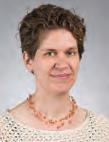

Betsey Behr Brada is a cultural anthropologist specializing in health and medicine in south ern Africa. Her upcoming book, Learning to Save the World: Global Health Pedagogies and Fantasies of Transformation in Botswana, relies on fieldwork gathered during Botswana’s HIV/ AIDS epidemic. The years of ethnographic data informing this manuscript also resulted in an American Ethnologist article that won her the 2013 Clark Taylor Paper Prize. She earned her PhD in 2011 from the University of Chicago.
Kelly Chacón was recently rec ognized by the American Chemical Society as a trail blazer among LGBTQ+ chem ists. They are a current Henry Dreyfus Teacher Scholar Award nominee, were awarded the Ed Stiefel

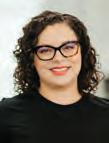
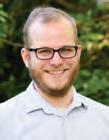
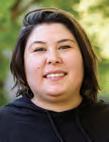
Early Investigator Award, and received the National Science Foundation’s most presti gious award for pretenure faculty. These and other awards have been a huge boon for their metal ion research. Chacón has leveraged their success as a teacher and researcher to make space for students of all identities to thrive in chemistry.
Victoria Fortuna launched the innovative Community Dance at Reed project in 2015. Her recent book, Moving Otherwise: Dance, Violence, and Memory in Buenos Aires, won the de la Torre Bueno First Book Award from the Dance Studies Association, and she recently coedited a special section of Theatre History Studies titled “Commingled Histories: Theatre & Dance.” Fortuna has received grants and awards from Fulbright, the Society of Dance History Scholars, and the Latin American Studies Association, among others. Her PhD in performance studies is from Northwestern University.
Greek Latin, and Ancient Mediterranean Studies; and Humanities
Tom Landvatter’s research focuses on the archaeology of death, burial, and impe rialism, and has been sup ported by the National Science Foundation and a Fulbright award. He has excavated ancient history at archaeological dig sites around the world. He is currently codirector of the Pyla-Kousopetria Archaeological Project’s (PKAP) excavations at the site of Vigla, Cyprus, a rare Hellenistic fortification. The project’s archaeological field school has proved to be fertile ground for intrepid Reedies since 2018. He holds a PhD in clas sical art and archaeology from the University of Michigan.
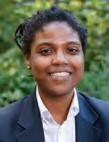
With degrees in film, litera ture, and law, Mónica López Lerma designs and teaches a variety of interdisciplinary courses at Reed in Spanish and the humanities. She is the author of the 2021 book Sensing Justice through Contemporary Spanish Cinema: Aesthetics, Politics, Law. In addition, she was the editor-in-chief of No-Foundations: An Interdisciplinary Journal of Law from 20122017 and currently sits on its editorial board. Her PhD is in Comparative Literature from the University of Michigan, but her two law degrees have allowed her to teach at law schools in Finland, Canada, and Kyrgyzstan.
LaShandra Sullivan is an anthropologist who came to Reed in 2016 and has made an impact on campus by serv ing on several Reed commit tees, cultivating discussion through the Comparative Race and Ethnicity Studies (CRES) Colloquium, hosting high-cal iber guest lecturers, and excelling in engage ment with students. She conducts ethnographic fieldwork on the ground in Rio de Janeiro and in the state of Mato Grosso do Sul. The latter informed both her disser tation and a forthcoming book, Unsettling Agribusiness: Indigenous Land Struggle in CenterWest Brazil. Her PhD in anthropology is from the University of Chicago.
Mir Bowring is an organo metallic chemist whose research program, funded most recently by a grant from the American Chemical Society, reveals the invisible
mechanisms of chemical reactions with applications in producing greener fuels like hydrogen.
Bowring has recently published papers with Reed undergraduate coauthors on airfree glassware and on large isotope effects in organometallic chemistry, and their inor ganic chemistry class participates in their research on reclaiming palladium from road dust. Bowring earned a BS in chemistry from Yale University before working as a high school chemistry teacher. They went on to earn a PhD from UC Berkeley and complet ed postdoctoral training at the University of Washington and Yale University.
Sam Fey is an ecologist who studies how populations and communities respond to, and are shaped by, environmental variation. Most of his research involves aquatic organisms, including fish, crustacean zooplankton, and phytoplankton. His research is supported by the National Science Foundation and has

incorporated efforts of Reed College students who work in both lab and field settings. He earned an Ecology and Evolutionary Biology PhD from Dartmouth College before work ing as a postdoctoral fellow in the Department of Ecology and Evolutionary Biology at Yale University. Since 2017, Sam has published 17 peer-reviewed articles involving 8 different Reed student co-authors.
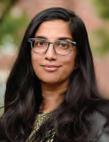
Prof. Radhika Natarajan is a historian of modern impe rial Britain whose article “Performing Multicultural ism: The Commonwealth Arts Festival of 1965” was published by the Journal of British Studies. Her monograph Empire and the Origins of Multiculturalism examines engagements between social workers and migrants to Britain from the decolonizing empire and will be published by Oxford University Press. In addition, she is coauthoring an introduction to imperialism with John Munro for Columbia University Press, as

well as writing a children’s history of the British Empire.
She obtained her PhD from UC Berkeley. Her scholarship and pedagogy incorporate the experiences of colonial subjects in order to both expand the range of actors and activity in the imperial past and to show how contemporary inequalities have been structured by colonialism.
Michelle Wang holds a PhD from the University of California, Berkeley, and came to Reed as an assistant professor of art his tory and humanities in 2015. At Reed she broadens students’ understanding of the art and archaeology of tenth-century BCE to third-century CE China, with an emphasis on early notational systems. Prof. Wang’s research interests include artisanal practice, history of technology, excavated texts, and mortuary culture. Her current book project reflects her interest in material culture and explores the multifaceted nature of early Chinese maps.
News of the Alumni Association • Connecting Reed Alumni Around the Globe
Greetings!
My name is Dave Baxter, and I wanted to introduce myself as the new Reed alumni board president. I graduated from Reed with a degree in psychology in 1987. I currently work as a stained and fused glass artist and adjunct faculty. I have vol unteered for Reed in a num ber of capacities, primarily through the Washington, DC, chapter of the alumni associ ation. I grew up in Troutdale, Oregon, and Reed was the only college to which I applied. I know, right? I am eternally grateful for the education I received at Reed. Some of the most talented, inclusive, and wisest indi viduals I know are Reedies, and I am privi leged to call many of them friends. I was a first-generation college student, and many individuals helped me during my time at
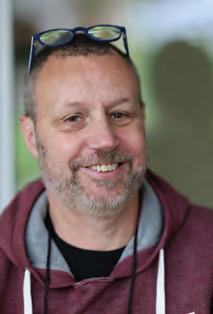
Reed; I am compelled to pay that forward.
You might wonder what the alumni board does and how we connect alumni. We have three committees to promote alumni connectivi ty: the Committee for Young Alumni, the Reed Career Alliance, and the Diversity and Inclusion Committee.
Each committee is chaired by an alumni board mem ber, and each board member serves on one of the committees. Although the committees are run by the alumni board, they are open to all members of the alumni community. Committee work is just one of the many ways your fellow Reedies volun teer. Visit alumni.reed.edu to learn about other opportunities to engage.
If you do not already volunteer for Reed, I encourage you to consider doing so. There
are so many ways to get involved, from being an alumni admission representative, to host ing a gathering in your local alumni chap ter, to just spending a few minutes updating your alumni directory profile. Did you know you can search for fellow alumni by name, class year, occupation, and even location? You control what information is shared, and you can set up a forwarding email to pro tect your privacy. The directory is perhaps the best way for alumni to find each other and (re)connect.
There are so many individuals that I should thank—people that make this work worthwhile! I can’t possibly do so here, but please know how important you are to both me and Reed. Your gifts, some finan cial, some otherwise, allow Reed to thrive. Please reach out to me if you have ques tions, ideas, or concerns.
Warmly, Dave Baxter dbaxter@alumni.reed.eduWestwind
October 14–16. Join us at Westwind on the Oregon coast! Enjoy the surf, sand, a talent show, green eggs and ham, and the unique setting that is Westwind with Reedies. Limited availability. Learn more: alumni.reed.edu/westwind.
Chapter events are back! Gather with Reedies in a city near you for drinks, tours, and book discussions. Check out the alumni chapter page for details: alumni.reed.edu/chapters.
October 21–23. The Forum for Advancing Reed (FAR) is Reed’s official volunteer weekend. Gatherings, workshops, and meetings focused on career coaching, professional networking, fundraising, chapter events, and more are planned for alumni who want to connect with other Reedies, learn more about what’s happening at Reed right now, and dis cover ways to get involved. Learn more: www.reed.edu/advancing-reed.
COME TO AN EVENT
Check out in-person and virtual events at alumni.reed.edu
VOLUNTEER
Advocate for Reed. Organize an event. Share your wisdom. Check out alumni.reed.edu/volunteer
GIVE TO REED
Make a gift at giving.reed.edu
STAY IN TOUCH
Let us know what you’ve been up to! Send in a class note or update your profile in the alumni directory. alumni.reed.edu 503-777-7589
The alumni board welcomes the following new at-large members, whose terms began on July 1, 2022, and the newest alumni trustee, whose term began April 6, 2022. See the whole board at alumni.reed.edu.
PORTLAND, OR
Major at Reed: Literature
Tell us about a moment of joy you’ve had over the past year. My two-year-old son and I went for our first bike ride around the neighborhood. It was a sunny summer day, and it felt like a core memory and continuation of a tradition.
If you could be doing anything right now, what would it be? Producing a beat or going to the coast.
What made you decide to volunteer for the alumni board? Having been a nontraditional student and having had a life-changing experience at Reed, I want to help improve the post-Reed experience for alumni.

PHILADELPHIA, PA
Major at Reed: Religion
What was your most recent streaming binge? Was it worth it? Star Trek Discovery Worth it, especially for Stacey Abrams’s cameo at the end!
Favorite spot on Reed’s campus when you were a student? Probably my first dorm room, which had a view of the canyon.
What made you decide to volunteer for the alumni board? alea and Sirius asked me, and I deeply trust both of them and want to support their vision.
LOS ANGELES, CA
Major at Reed: History
Tell us about a moment of joy you’ve had over the past year. Going to the Berkeley Marina with my dog.
What was your most recent streaming binge? Was it worth it? Stranger Things season 4. Worth it because it let me participate in the discourse, not really worth it for the overall quality of content.
What made you decide to volunteer for the alumni board? I wanted to help shape Reed’s future.
Major at Reed: Anthropology
What is your favorite object in the room you are currently sitting in? Well, I’m in my mom’s office, so there’s not much here to like. My dog Snickers is here with me, so I guess she counts.
Tell us about a moment of joy you’ve had over the past year. Learning I was pregnant with my first child.
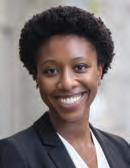

What made you decide to volunteer for the alumni board? I am interested in working on the diversity and inclusion committee, and I’m especially glad to be doing this with alea adigweme’s leadership, as she is a Reedie friend of mine.
LOS ANGELES, CA
Major at Reed: Biology
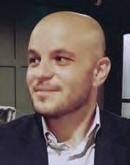
Tell us about a moment of joy you’ve had over the past year. Dancing in a British pub to “Don’t Stop Believin’” by Journey.

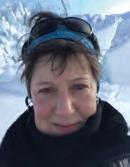
Favorite spot on Reed’s campus when you were a student? Cherry blossoms in the spring at Eliot Circle :)
What made you decide to volunteer for the alumni board? Reed is awesome! I’m proud to be a Reed alum. I’d like to show my appreciation for my alma mater and help past and current Reedies connect.

Major at Reed: Psychology
What was your most recent streaming binge? Tales of the City. I hated to see it end. It almost reminded me of living in a Reed dorm or house.
If you could be doing anything right now, what would it be? Sitting on a riverbank in some remote place, sipping on bourbon, after a great day of rafting and hiking.
What made you decide to join the board of trustees? I value the type of education Reed offers and know the importance of engaged alumni volunteers and donors to its continued success. I’m willing to do my part, and it’s truly energizing to be around smart, thoughtful people.
An online database was supposed to make college more transparent. Instead, Reed students found, it’s sowing confusion.
BY MEGAN BURBANKHow does a high school student decide what college to go to? If you think choosing a school based on earning potential is the best way to decide, students in Reed’s Math 343 class have some data to share with you. As part of their coursework with Prof. Hank Ibser [math], Reed students Wolfgang Brightenburg ’23, Robin Hart ’23, Bhav Khurana ’23, and Tina Qin ’23 found major methodological flaws in College Scorecard, a common online tool break ing down students’ annual income according to where they attended college. Their findings raise complex questions about what a mean ingful college experience really is—and how to measure it.
“As current college students ourselves, we recognize the myriad of factors that went into our own respective decisions to pursue higher education at Reed College in specific,” wrote the students in the report on their findings, which concluded that College Scorecard failed to take a comprehensive look at the many ways of assessing student success. “This is differ ent from the motivating factors of our friends from high school, who went to other places, or did not go to college at all. The merit of an education cannot be reduced to a paycheck, nor can a person’s skills.”

And even if all that mattered to you was a paycheck, College Scorecard wouldn’t be the best way to measure it, they found. The web site, introduced under President Obama, was intended as a way for prospective students to assess individual colleges’ offerings based on student outcomes, but by focusing on earning potential. There’s just one problem: it doesn’t do that. At least not in the way it’s meant to.
In collaboration with the Center for Life Beyond Reed, the Math 343 students paired College Scorecard with a second data set known as the HEDS (Higher Education Data Sharing Consortium) alumni survey to fact-check College Scorecard’s breakdown of alumni earnings. In Reed’s case, they immedi ately identified a $10,000 gap between gradu ates’ self-reported earnings and those listed on College Scorecard. Additionally, only stu dents receiving federal aid were included in College Scorecard’s data. “That’s a really impor tant population,” says Hart. “I receive feder al aid myself. But I know that for Reed that’s about half the student body, and so over half of people are left out of this supposedly really representative database of what college out comes are.”
That wasn’t all. The numbers might have been more accurate, says Ibser, if they’d included students across all majors at every school surveyed. But they didn’t—until recently. College Scorecard reported alum ni earnings by major, and Reed’s valuation included only English majors, said Mike Tamada, director of institutional research. This was due in part to privacy concerns: some majors have so few participants that one could, in theory, find out someone’s sal ary information based on the data. When, in January of this year, the College Scorecard changed its practices and all majors were included, it reported Reed’s median reported earnings $33,000 over prior reports.
Focusing on alumni income five years after graduation was also constraining. The numbers poorly account for one very specif ic reason students may not have high earning potential after finishing college: many go on to grad school. This is especially true at Reed, which is ranked fourth nationally in producing doctoral degrees across all disciplines among undergraduates. Although College Scorecard excludes earnings of graduate students, this means important population of highly sucess ful Reed graduates are not accounted for. Ibser says, “Reed students tend to catch up later on.”
And of course, money isn’t everything. Using the HEDS survey, Ibser’s students keyed in on alternative metrics more likely to indi cate the quality of a college experience, digging into graduates’ satisfaction and the reasons behind it, and things like ongoing engagement with their colleges in the years after complet ing their education.
From this analysis, a more holistic pic ture of college success emerged, one that accounts for varied, qualitative experienc es that stretch far beyond tracking income in the five years after graduation. “For Reed alumni in particular, faculty research and professors encouraging critical thinking were the most influential on their satisfac tion with the school,” the students wrote in their report, saying that attempts to evaluate
students’ experience should factor in school offerings like these.
Money also wasn’t the only thing that students cited when they had a positive college experience. “We found, essentially, that satisfaction doesn’t predict your income, which we thought was really interesting,” said Hart. “Someone could absolutely love the college they went to, but maybe not make a lot of money.”
This might fly in the face of normative definitions of success, but it wouldn’t be the first time a group of statistics-minded Reedies poked holes in the higher-ed status quo. In 2019, Reed students deconstruct ed the methodology behind U.S. News and World Report’s annual college rankings, and found that Reed, which fell precipitously

down the list after refusing to participate in 1996, was inaccurately ranked. Though U.S. News rejected the conclusion, it bumped Reed up the list. The students’ research even attracted the attention of Malcolm Gladwell, who dedicated a podcast episode to the rankings, finding the list was root ed not in sound methodology but social stratification.
Developments like the Varsity Blues college admissions scandal further punc ture accepted norms about what makes for a good education, and cultural tendencies to value qualities like prestige over more idio syncratic experiences tailored to individual student needs. Hart said they’d grown up on the receiving end of messaging suggesting that Ivy League schools were the best, but
that old ideas equating quality with elite schooling were shifting.
“I feel like the more I get out into the world and the more I engage at Reed and beyond, I hear people pushing the enve lope in terms of what a good school is,” they said. The change even showed up in their own experience applying to graduate school, a process driven not by an end goal like attending a revered institution, but by attending the right one for their specific educational goals. It wasn’t about apply ing to Harvard, they said. “It’s more like, ‘Well, is there anyone at Harvard that you’d want to work with? What are the faculty members there doing research on?’ And I think that’s a really good frameshift to be thinking about.”
You can say one thing for the class of 2022—they’re resilient. In the face of a global pandemic, economic meltdown, and immense social dislocation, they stayed true to their compass and finished their theses. We decided to interview 12 of them to learn more about the people, places, and ideas that inspired them.
BY RANDALL S. BARTON Aemann 弌曼 GREEK, LATIN, AND ANCIENT MEDITERRANEAN STUDIES & POLITICAL SCIENCE
Thesis adviser: Peter Steinberger [political science]; Nigel Nicholson [Greek, Latin, and Ancient Mediterranean Studies]
Theses: political science thesis: “On the Facticity and the Normativity of Rationality: A Reading of the HabermasBrandom Correspondence (1999/2002).” GLAM thesis: “The Literary Form of the Dialogue and the Ethics of Philosophy in Plato’s Gorgias.”
What it’s about: PoliSci thesis: W hy I think that Kant’s Critique of Pure Reason bears political relevance. GLAM thesis: W hy I think that Plato believes that we should be mindful of how to have a conversation.
Influential professors: My two most influential professors were my thesis advisors, Peter Steinberger and Nigel Nicholson, but Prof. Ellen Millender [GLAM] showed me how to engage with secondary sources; Sonia Sabnis [GLAM] made my double major possible and supported my somewhat random language studies. Alice Hu [GLAM] taught a wonderful class on Sophocles’s Ajax.
Influential book: My Broken Mariko by Waka Hirako and One Piece by Eiichirō Oda.
Cool stuff: I drew manga; played the harpsichord and the organ (thanks to generous funding from the music department ); taught myself Latin and then placed in advanced Latin with help from Prof. Sonia Sabnis.
Challenges faced: Learning how to participate in conference in a respectful manner and build on what others have said; learning how to write; learning how to be wary of, and articulate, what I do not know; and learning how to have a conversation.
How Reed changed me: I don’t want this to sound like Reed propaganda, but my amazing professors taught me how to be responsible for my own thoughts and life, and be kind.
What’s next: Pursuing my PhD in politics at Princeton University. In terms of life aspirations, I want to be a mangaka.
Hometown: Costa Mesa, California
Thesis adviser: Alejandra Roche Recinos [anthropology]
Thesis: “Reconfigurations of Indigeneity and Tourism in Yucatán, México”
What it’s about: Indigeneity is used in tourism to conjure fantasies of the landscapes and culture of Mexico that appeal to tourists, and tourism in general relies on the movement of foreign bodies and creates power imbalances between tourists and those on the other side of the tourists’ gaze. My thesis focuses on an ecotourist destination that relocates agency in the local community through its work. I argue that Indigenous communities in Mexico are using the channels provided by tourism to co-opt and rewrite narratives of Indigeneity to serve their own ends within the broader contexts of state intervention and the tourism economy.
What it’s really about: A really cool ecotourist destination in Yucatán, Mexico, managed by a cooperative of Indigenous women.
In high school: I was earnest, gregarious, and sanguine.
Influential class: Prof. LaShandra Sullivan introduced me to anthropology and fundamentally changed how I see the world. I learned that affective and bodily knowledges tell us more than intellectual, mental knowledge, and that we are all always in relation with each other, across physical and temporal boundaries.
Concept that blew my mind: Mikhail Bakhtin’s concept of dialogism, which asserts that every act of language is always positioned in relation to an audience, whether imagined or real. This means that everything we say is always already in dialogue; no act of language is ever isolated or independent from the contexts that surround and foreground it.
Cool stuff: I worked in the Reed canyon, made amazing friends—human, plant, and animal—and learned a lot about ecological restoration techniques and native plants.
How Reed changed me: I’m more gullible now, which is a way of saying that I’ve learned to entertain multiple simultaneous truths rather than seek out a singular endall, be-all answer.
What’s next: Working yearround at a summer camp in California that empowers LGBT+ and BIPOC youth through outdoor education.

Hometown: Denver, Colorado
Thesis adviser: Noelwah Netusil [economics]
Thesis: “Surveying Risk Perceptions of Nuclear Energy in the Pacific Northwest”
What it’s about: Seeking to understand, through a representative survey, the risk perceptions adults in the Pacific Northwest have about nuclear energy. I ask what, if any, characteristics and demographics influence or are correlated with risk perceptions in order to better understand our contemporary policy landscape.
What it’s really about: Which people are wrong about nuclear energy and why? (This was also an excuse to collect and play with survey data.)
In high school: I was the secretary general of our Model UN team, editor of our school paper, and stuttered my way through two Mock Trial state championships.
Influential class: Prof. Noelwah Netusil was my guiding light through Reed. She pushed me, showed me how to use economics for good, and helped me navigate too many catastrophes to count.
Influential book: Open by Prof. Kim Clausing.
Concept that blew my mind: Many of the most significant issues (climate change, war, incarceration, etc.) affecting the world might be resolved if we could capture and appropriately price-in externalities.
Cool stuff: I was a reactor operator and mentor at the Reed Research Reactor, president of the Finance and Investment Club, a disability advocate for people with speech impediments and stutters (like me!), started the Reed Chapter of the American Nuclear Society, captained the CFA Challenge team, and wrote for the Quest
Challenges faced: Between the pandemic, 2020 election, fires, protests, global conflict, economic uncertainty, and a tree falling through my room, I am just happy I made it through in one piece.
How Reed changed me: Reed made me more curious, made me acknowledge and appreciate who I really am.
Awards: A data science fellowship to work with Prof. Kelly McConville at Harvard, economics research fellowship, summer internship award to study the economic impact of COVID19 on a small Washington city, and Undergaduate Statistics Class Project winner.
What’s next: Working with international research groups and traveling, then heading off to grad school.

Hometown: San Jose, California
Thesis advisers: Profs. Anna Ritz [biology] and Julia Michaels [biology]
Thesis: “Impacts of Backyard Habitat Creation for Birds at Single Yard and City-Wide Scales”
What it’s about: How do small-scale urban restoration projects—in this case the implementation of “backyard habitats” via the Backyard Habitat Certification Program—function to support birds? I’m interested in how this established network of backyards can serve as a system of habitat corridors to increase overall habitat connectivity and accessibility for birds across Portland!
What it’s really about: How can we support birds in urban ecosystems?
In high school: I was quiet, shy, and just as much of a bird nerd.


Influential class: Wildlife in America made me reassess the idea of conservation as a social issue just as much as an environmental one. I came to understand that the health of societies and the environment are inextricably linked, that actions taken for wildlife inevitably affect people, and that conservation issues must be approached in a socially just way.
Influential book: The God of Small Things by Arundhati Roy shows how universals such as grief, loss, and love become much more complicated in the context of boundaries set by larger society.
Concept that blew my mind: Biological cascade reactions— how a single signaling pathway can be responsible for several different responses!
Cool stuff: I presented a poster at a scientific conference in Austin, volunteered at the Reed Community Pantry, tutored for intro bio, learned to pour latte art as a volunteer barista, and rehabilitated injured wild birds at the Audubon Society.
Help along the way: I received generous grants from the biology department and the Center for Life Beyond Reed to conduct summer research and present at conferences.
Challenges faced: Conducting over 100 earlymorning bird surveys for my thesis in the span of a semester—such are the demands of field research!
What’s next: Working as a grassland bird intern at the Smithsonian Conservation Biology Institute over the summer, then starting a research assistant position at the University of Maryland on modeling animal movement.
Hometown: Maryland and Atlanta, Georgia
Thesis adviser: Glenn Baker [psychology] Thesis: “Showing Up and Showing Out: Predictors of Black Lives Matter (BLM) Protest Endorsement and Protest Action Type in Portland, OR”
What it’s about: Looking at 2020 Black Lives Matter (BLM) demonstrations in Portland, my research questions which attitudes, social (environmental) factors, and protest behaviors predict endorsement of or participation in protest. It’s significant as it occurs in the midst of ongoing calls for police abolition, an end to police brutality/racially motivated harm, and equal rights/equitably distributed resources for Black folks.
What it’s really about: How Portlanders show up regarding BLM protests— physically and in other ways—and what attitudes and behaviors predict this.
Influential class: Prof. LaShandra Sullivan’s Black Queer Diaspora course was relevant to my identity and how I show up in the world as a Black queer/quare femme.

Concept that blew my mind: Rest as resistance! Accessing dream spaces to dismantle oppressive systems and using rest to step into our full humanity.

Influential book: Unapologetic: A Black, Queer, and Feminist Mandate for Radical Movements by Charlene Carruthers speaks to the centuries of systemic violence and greed taking place in the forms of capitalism, patriarchy, anti-blackness, and white supremacy, genocide, and erasure of Indigenous peoples and their land and resources.
Cool stuff: Multicultural Resource Center (MRC) programming, SEEDS, Special Collections & Archives, Black Student Union, and helping throw Nasty Ball (iykyk).
Help along the way: Without the aid I received, I wouldn’t have been able to attend this school. I still have loans and am of the mindset that education should be free (especially for Black and Indigenous folks in this country).
Challenges faced: Being Black and low SES navigating a campus that was not designed for people who look like me presented an array of challenges, including institutional racism, experiencing discrimination on and off campus, and academic stress.
What’s next: Things happen for a reason and within divine timing—hopefully opportunities that allow me to farm and be able to tend and steward land.
Hometown: Columbia, Missouri
Thesis adviser: Prof. Jae Yeun Choi [creative writing]
Thesis: “Diplopia”
What it’s about: Memory and remembering; various vessels for containing and uncovering history (the body, the home, the connections that bring people together); moments of and sites for transformation; in (in)sight and perception of the self and everything that has made it.
Influential classes: Poetry classes with Prof. Jae Yeun Choi and English classes with Prof. Kritish Rajbhandari opened my eyes to ways of seeing, understanding, and analyzing the world.
Concept that blew my mind: Posthumanism and the phenomenology of whiteness.
Cool stuff: I learned how to surf and juggle, studied and assisted with metalorganic aerosol reactions in an environmental chemistry research lab, assisted with oceanic postcolonial fiction research, people-watched during late night shifts at the college bookstore, participated in some amazing poetry readings, completed a manuscript of poetry, and assisted with editorial work for Bitch Media with Federal Work-Study.
Awards: I received a Locher grant (2020) to write a collection of poetry titled "Fingering Through the Compost" and an Eddings grant to edit and expand my creative thesis manuscript.

Challenges faced: The academic and social culture at Reed can definitely suck you in if you’re not careful. It took me a second to find what kept me grounded, balanced, and happy once the intensity of the school year kicked in.
How Reed changed me: My time at Reed truly changed the way I think about and approach the world. I learned how to formulate and follow the questions that matter to me, explore the many directions that it will inevitably proliferate into, and uncover, thoroughly and with trust and confidence in my own intuition and perception, how to sift out answers.
What’s next: I'll be traveling soon, first to NYC and then to South Korea. After I come back to the U.S. I plan to work, write, and recenter myself while I clarify my next steps. I want to eventually do an MFA and maybe go back for a PhD, but for now I'm excited to read, learn, and write outside of a school setting.
Hometown: Saint Paul, Minnesota
Thesis adviser: Noelwah Netusil [economics]
Thesis: “Think Green, Think Chocolate: A Case Study of Corporate Social Responsibility and Sustainability in the Chocolate Industry”
What it’s about: My thesis explores themes of corporate social responsibility, supply chain resiliency, and industrywide sustainability in the chocolate industry. Through a case study approach, I analyze four different chocolate-producing firms on their perspectives on supply chain management and sustainability given current industry trends.
What it’s really about: Why people should care more about chocolate and how firms are approaching sustainability when crafting these delectable confectionary treats.
Influential book: Erika Lee’s America for Americans: A History of Xenophobia in the United States underscores the importance of immigration and migration history in the United States and how the nation still suffers from irrational fear and hostility towards immigrants.
Concept that blew my mind: Jacob Lawrence’s use of color and social realism in his 60 panels from The Migration Series taught me about the importance of every brush stroke.
Cool stuff: I worked with the admission office, participated in the Reed Financial Services Fellowship, hosted KRRC shows, interned at Goldman Sachs, and learned how to play squash, do yoga, ski, and use a map and compass through the PE program.
Help along the way: Being a first-generation Hmong American, I had limited financial resources, and I am so grateful to have been able to attend Reed thanks to the generosity of Reed donors. I hope I can inspire students to reach for the stars, no matter what the sticker price says.

Challenges faced: Thanks to my humanities conference leader, Prof. Nathalia King, I was able to learn how to find my voice in the classroom, which gave me confidence outside of the classroom as well.
How Reed changed me: Reed has taught me to take a step back, look at the bigger picture, and to look at things from various perspectives.
What’s next: Moving to Salt Lake City, Utah, and working as an analyst at Goldman Sachs.

Hometown: Ho Chi Minh City, Vietnam, and Portland, Oregon
Thesis adviser: Paul Manson [political science]
Thesis: “The Impact of States’ Policy Choices on College Completion Rates in the United States”
What it’s about: What happened after college admissions? College enrollment rates are high in the U.S., yet many students do not finish their degree. My thesis explored the impact of states’ appropriations, citizens’ disposable income, and K–12 expenditures on college completion rates in the U.S. from 2001 to 2014.
What it’s really about: Inequitable access to higher education started early. Like, really early.
Influential class: Prof. Victoria Fortuna [dance] teaches me that I need to listen to how my body “thinks”—that even though I don’t consider myself a dancer, I’m dancing every day. I relied on methods from my dance ethnography class to write a political science thesis, which is the beauty of a Reed education.
Cool stuff: Transfer Student Group and Vietnamese Student Association.
Socializing during a pandemic was awkward, yet we found ways to be in each other’s company.
Help along the way:
I was able to go to college because of Reed’s generous financial aid package. I could not believe my eyes when I got the email. I am determined to pay it forward because I had folks who believe in me. The Ford Family Foundation helped me with room and board, a supportive community, and muchneeded mental support.
As a nontraditional transfer student, I was afraid that I would feel out of place. Ben Bradley (registrar’s office) helped me sort out my credits when I first transferred and became a friend. B Hunter (CLBR), the most supportive career advisor ever, connected me with Reed alums who helped kickstart my career in policy analysis.
How Reed changed me: Reed encouraged me to be more patient and comfortable with my own learning process and pushed me to become a better thinker, speaker, and writer.
What’s next: I will be a policy analyst, working with the Oregon Center for Public Policy!
Hometown: Pune, India
Thesis adviser: Jon Rork [economics]
Thesis: “Mandi Markets: An Economic Analysis of the Effects of State-Run Markets on Farmer Market Outcomes and Satisfaction in India”
What it’s about: My thesis empirically investigates the effects of state-run “mandi” markets on the market outcomes for farmers in India. Agriculture is often an oligopsony market, where farmers only have a handful of buyers competing for their produce. My thesis shows that proximity to state-run markets improves farmers’ market outcomes as the existence of a viable outside option reduces the market power of private traders.
What it’s really about: In agriculture, competition between buyers means better outcomes and thus satisfaction for farmers.
In high school: I was an energetic, social butterfly who participated in as many extracurricular activities as I could pack into my schedule.

Cool stuff: I cofounded the South Asian Student Union, cochaired the Student Committee on Academic Policy and Planning, and was a member of the Student Committee for Diversity. I also coled the Mountaineering Club and worked as a confidential advocate for survivors of on-campus sexual assault.
Influential classes:
Prof. Kambiz GhaneaBassiri’s class on the erasure of Islam from the Western humanities was eye-opening and helped me finally understand some of the reasons why the distinction of the West historically arose. Prof. Jon Rork’s class on urban economics helped me realize my passion for urban policy—something I plan to pursue as a career.
Help along the way: I am immensely grateful for the financial aid I received from Reed and would not have been able to be here without it!
Challenges faced: I had to adjust not only to a completely new academic environment, but to a completely new country. Culture shock often comes in forms you least expect.
How Reed changed me: I have a newfound respect for how infinite knowledge is and feel comfortable acknowledging when I do not understand something.
What’s next: I'm working at ECONorthwest, a firm that specializes in policy consulting, especially around urban and natural resource policy.
Hometown: Bend, Oregon
Thesis adviser: Prof. Carla Mann [dance]
Thesis: “Giving up the Ghost: Selfhood and Otherhood in Technologized Dance”
What it’s about: When technology is incorporated into dance performance, how does it change an audience’s perception of the dancers’ identities?
What it’s really about: Dancing while being transgender and online.
In high school: I was so excited to move on to college and discover communities that feel and think like me.
Influential classes: Prof. Victoria Fortuna’s Dance, Gender, and Sexuality class changed the way I think about my own identity, how I move through space, and how dance acts as a cultural signifier and cultural creator. Prof. Carla Mann’s Dance Improvisation taught me to think with my entire body and to understand how we learn by moving.
Influential book: Zora Neale Hurston’s Their Eyes Were Watching God is one of the most gorgeously written books I’ve ever read.
Concept that blew my mind: The popularity, specific shape, and design of massproduced dinnerware used in the United States is directly correlated with the rise of the American middle class, the post-WWII economic boom, and the assimilation of European immigrants into the myth of the American “melting pot.”
Cool stuff: Ran KRRC during a pandemic and hosted a radio talk show, worked at OMSI and the Q Center, threw several balls, fell in love with ceramics, choreographed and directed a thesis production.
How Reed changed me: The privilege of existing among Reedies taught me so much about the kind of person I want to be and the ways I can grow to get there. The Reed dance faculty showed me how movement and embodiment is a form of knowledge that I can use to create spaces for myself in the dance world.
Help along the way: Reed would not have been possible for me without financial aid.
What’s next: Earning my PhD in performance studies so I can teach and conduct research about gender, identity, and dance.

Hometown: Castro Valley, California
Thesis adviser: Prof. Gerri Ondrizek [art]

Thesis: “What We Want, What We Need: Community Solidarity, Diaspora, and Resistance as Immigrants”
What it’s about: I examine the radical resistance of preparing and serving meals to immigrants and refugee families in the United States and how relational aesthetics combat narratives of isolation and exploitation as a result of Western Imperialism. Drawing on ideas of horizontality and the transmigrational experiences of people of color, I explore the act of spoken conversation and food as acts of cultural modes of production and the phenomenon of subversively existing.
What it’s really about: Holding two dinner parties where I can be in conversation with immigrants and children of immigrants about the reasons we are here, the challenges we face, and the recognition of our resilience.
In high school: I was intensely focused on school and producing art on every notebook, wall, or pizza box I could get my hands on!
Influential book: Nervous Conditions by Tsitsi Dangarembga presents nuanced considerations of Zimbabwe/Rhodesia in the transition period around white minority rule.
Influential class: Race and the Politics of Decolonization with Prof. Radhika Natarajan [history] gave me the language to talk about complex issues surrounding race and racial divisions and introduced powerful thoughts about how colonial privilege manifests in our modern society.
Concept that blew my mind: Much inequity is created and intentionally institutionalized so that the oppression can continue in future generations.
Cool stuff: Zumba classes, the Multicultural Resource Center, and tutoring middle school and high school students.

Help along the way: I am extremely grateful for the substantial financial aid provided by Reed. Further acknowledgment is needed that higher education and the ability to afford a private school degree is a privilege based on generations of classand race-based oppression.
How Reed changed me: It allowed me to find intimacy with friends and community in a way I have never felt before.
What’s next: Pursuing a creative career while working within communities and historically marginalized populations.

Hometown: Poulsbo, Washington
Thesis advisers: Profs. Kate Bredeson [theatre] and Catherine Witt [French]
Thesis: “‘At This Point the Audience Must No Longer Know What is Happening’: Postdramatic Memory and the Embodiment of Ambiguous Loss in Marguerite Duras’s Savannah Bay (1982-3)”
What it’s about: In the play Savannah Bay, two women struggle to collectively reconstruct the incomprehensible traces of a traumatic event which ties them together: a history of love and loss, the mythic origins of an intergenerational bond of suffering and survival. I close-read the original, experimental 1982 script; compare it with the more streamlined 1983 production text; and describe my process directing the original script on the Reed College stage.
What it’s really about: Linear, straightforward storytelling might not be the way to embody experiences which aren’t experienced or processed in a linear, straightforward way.
Influential professor: Prof. Tamara Metz’s clear, iterative approach to writing assignments and thoughtful feedback helped me in everything from literary close readings to psychology research papers. The way she worked to promote an ethics of care and collaboration in the classroom was inspiring and informative to my practice as a theatre director.
Influential book: In Mad Love and War, a stirring collection of poetry by Joy Harjo, unfolds in a spiraling structure, reflecting the transformation of memory into an always active, imaginatively and collectively developing subject.
Concept that blew my mind: The rhizome as a literary concept. The idea of a mode of representation that defied the simplicity of linear causative logic and explored the nonhierarchical interconnectedness of all things spoke to my experience of the world and to my favorite forms of meaningmaking through art.
Cool stuff: I led two playwriting workshops, directed three plays, including two original musicals, translated a play from French with Prof. Kate Bredeson, and received the David Eddings Literature and Language Scholarship.
What’s next: I’m spending the summer as a teaching artist intern at Seattle Children’s Theatre, then moving to Maine in the fall for a company management apprenticeship with Portland Stage. As long as I’m working with others in an imaginative and experimental context, in the spirit of helping others and in a manner that promotes personal lifelong learning, I’ll be on the right track.
Books. Music. Film. Send us your work!
EDITED BY ROBIN TOVEY ’97 Email reed.magazine@reed.edu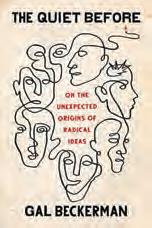

The year was 1968, and a Russian poet moved between empty apartments to clandestinely type up censored pamphlets, known as samiz dat, to document abuses by Soviet leaders.
In 2017, members of the alt-right chat ted endlessly on Discord, mapping out plans for an organized, aggressive gathering in Charlottesville, Virginia.
In 2020, as a novel virus surfaced, scien tists, doctors, public health experts, and oth ers conversed anxiously on a long email chain named “Red Dawn” about what to do.
Such radical and revolutionary movements seem to take root in intimate spaces and media, a new book by reporter Gal Beckerman ’98 tells us—and the media in which these extraor dinary, sometimes treacherous seeds are sown have evolved. In his expansive, well-researched second book The Quiet Before, Beckerman deconstructs how various media worked in the past as incubators for new ideas, and asks if, and how, they do so now.
Exploring stories of new thought, from preand post-internet movements, he argues that in order for new ideas to fully flower—or fes ter—they need secluded space and time in which to do so. Beckerman builds his argu ment by first looking at historical figures and movements and the various platforms where they nursed ideas—some effective, others not. He chooses lesser-known exam ples to explore, which provides for a fresh and intriguing history lesson. A particular standout is a chapter on anticolonialist ideas circulating in the “Grumblers’ Row” section of a Ghanian newspaper from the 1930s. The newspaper at the time was helmed by Nnamdi Azikiwe, the future president of Nigeria, who welcomed discussion in his paper. Beckerman says, “The debates in the pages of the Post were sometimes serious— one forum straightforwardly asked the readers, ‘Is the Gold Coast a nation?’—and sometimes
trivial, but they were the only way to move an anti-imperialist move ment forward.” With evocative nar rative, a chapter on the 1990s-era zines (self-produced mini books that could be easily xeroxed and distributed) of the Riot Grrrls (an organically grown third-wave feminist group that rose out of punk culture) also stirs nostalgia for these more tangible forms of thinking and communication.
When the book turns its attention to the internet era, there’s no audible buzz of
dial-up or flashing computer screens, but the distinctly different atmosphere of the cyberspace is palpable. Suddenly, we are in the moment where “an uprising . . . now scheduled on Facebook” doesn’t sound ludi crous. Money is inextricable from contem porary platforms that host radical ideas, where platform developers have to deal with “constant pressure to figure out how to make this work as a business.” This umbrella of capitalism makes the social and political movements of the internet age appear less authentic, as if they can be bought by the highest bidder.
Beckerman argues that the “symbolic wins” that happen on social media are part of the obstacles radical thinkers meet at present. (He gives the example of Lululemon pledg ing to “unveil historical erasure and resist capitalism” in the wake of George Floyd’s murder.) The disembodied space that is the internet, where anonymity and speed create quick, but artificial, change is another such obstacle. However, Beckerman emphasizes that the internet provides a platform never before available. The question remains, can we use it to cultivate true transformation?

 NORA HICKEY
NORA HICKEY
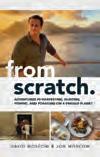
Jon Moscow ’69 has cowritten a book with his son David Moscow, the creator, executive producer, and host of From Scratch, a cable television show based upon the book. Their book is a global travel journal that takes the reader on deep dives (sometimes literally) with fisherfolk, farmers, scientists, community activ ists, historians, hunters, and more, bringing back stories of the commu nities, workers, and environments involved—some thriving, some in jeopardy, all interconnected with food. In addition to this project, Moscow is coexecutive director of Ethics in Education Network and cohost of the Ethical Schools podcast. He actively works to support asylum seekers with housing and links to social services. (Permuted Press, 2022)

Joan Rudd ’69 recalls her life from a feminist, Jewish, and largely humor ous perspective. Illustrating with original sculptures, drawings, and pho tographs, Joan writes about both coasts: a childhood among postWWII refugees in Manhattan, and then leaving her family for college, marriage, a commune, and art school in Portland, Oregon. She shares some of the pivotal events and decisions involved in ultimate ly leaving Portland for Seattle, through a second marriage and the raising of two sons born 23 years apart, all the while creating origi nal sculpture and drawings. (Strudel Press, 2022)
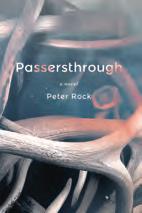
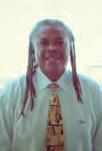
A new novel by Prof. Peter Rock [English & creative writing] involves a murder house, a fax machine, communications between the living and the dead, and a mountain lake that moves from place to place. Passersthrough has been called “a gripping, slippery, spooky book about fragile family bonds, loneliness, and what we choose to remember.” The story fol lows a father as he does his best to recon nect with his estranged daughter; at the heart of their disconnect is the mystery behind the week, nearly 25 years prior, she disappeared in Mount Rainier National Park. Where did she go during
Andre’ S. Wooten ’70, attorney at law and CEO of his company African History Videos, has published a new installment in his educational video series on Black world history. This latest video looks at four billion years of climate change and how the ice ages affected human migration. Previous chapters have followed his travels to Africa, the Caribbean, the South Pacific, and great museums to show the evidence of ancient African civilization before the Atlantic slave trade.

Geordie Duckler ’81 is a lawyer and scientist specializ ing in animal law cases. His first aca demic book exists at the intersection of two complemen tary and conflicting perspectives: law and biology. From the vantage point of both disciplines, Juris Zoology provides a comprehensive framework to objectively assess the role and significance of animals in American civil and criminal law. Contrasting the views of animal rights activists, Duckler examines animals in terms of their prehistory, history, biology, social utility, eco nomic effect, and aesthetic value and ultimately refutes the proposal of granting animals legal rights. (Rowman Littlefield, 2022)
that time, and what did she bring back?
Speaking with an interviewer at Powell’s about Passersthrough as a “spiritual suc cessor” of My Abandonment, which was adapted into the acclaimed film Leave No Trace, Rock shares insights into his creative process. “Nothing comes from nothing, and it’s true that in the past I’ve perhaps more consciously collected arti facts and histories, artworks and other books to react to, to surprise myself, to see what came out of me. This time it was more like I was let ting the story come to me as I walked around like a bewildered magnet.” (Soho Press, 2022)
The Pearl and the Flame: A Journey into Jewish Wisdom and Ecological Thinking

Rabbi Natan Margalit ’82 has a new book woven with stories of his jour ney from a secular upbringing in Honolulu to Orthodox Judaism in Jerusalem, and back to his own spiri tual path. His book proposes a new integration of ecological thinking and core Jewish concepts to help us move from isolation to connec tion. This approach puts Judaism at the forefront of efforts to com bat climate change, the culture of addiction, and social fragmentation. Proposing that Judaism, along with other Indigenous and traditional cul tures, has preserved ways of think ing that existed before we learned to dissect the world, he is hope ful that seeds of understanding can be nurtured through seeing patterns and relationships in less reductive terms. (Albion-Andalus Books, 2022)
A new book by Maria Heim ’91, pro fessor of religion at Amherst College, is a treasury of emotion terms drawn from some of India’s earliest classi cal languages. The collection fea tures 177 jewel-like entries evoking the kinds of phenomena English speakers have variously referred to as emotions, passions, sentiments, moods, affects, and dispositions. The entries serve as literary and philosophical vignettes that con vey the texture of Indian thought and the multiplicity of conversations about emotions in Indian texts. The book reveals how Indian ways of interpreting human experience can challenge assumptions about emo tions and enrich our lives. (Princeton University Press, 2022)


Joseph Orosco ’92, professor of phi losophy at Oregon State University, argues that if we want help trying to imagine a way for ward to a more just and humane future, then Star Trek is a place to begin, with stories that inspire one to think about a humanity devoted to cooperation, human rights, sustainability, and racial justice. In addition to teach ing courses on social and political philosophy, particularly democrat ic theory and global justice, Orosco is also the codirector of the Anarres Project for Alternative Futures. Previously he wrote César Chavez and the Common Sense of Nonviolence. (Bloomsbury, 2022)


Frederic Bahnson ’99 opens his book with a quote by Jean-Paul Sartre, “We are our choic es,” and it sets the tone for his guid ance about mak ing better decisions when faced with challenging choices. Based on psychology and decision-sci ence research, the discussion in Better than Destiny is informed by Bahnson’s years of work both as an engineer and as a physician, and his experience of choosing and then making the career change that led from one to the other. He says this is the advice he wishes he’d had at his own life turning points—like the period after grad uating from Reed. (Lioncrest, 2021)
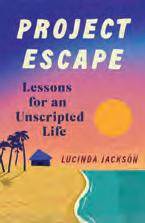
A new book by Lucinda Jackson ’73 is no sudsy tale of packaged enlightenment set against the backdrop of tropical sunsets. Instead it is the story of her selfimposed challenge to swap out a career-centric life for something differently mean ingful, an undertaking she calls her “Project Escape” (other possibilities included “Project Icarus”!). Jackson’s project? She sets off as a mature Peace Corps volunteer to Palau, with a vision plan, goals, and even a scorecard for her assignment. Her memoir, Project Escape, is an engaging travelogue about her unexpected expe riences and adaptation.
Hoping to achieve a mellower state of mind after leaving the corporate track, Jackson, a harried scientist and business executive, figures that assim ilating to island life will do the trick. However, the service project and living arrangements are coordi nated by a dysfunctional organization, and are not as advertised. She struggles with deviating from her plan, and she is forced to have some pointed conversations with herself about longtime author ity issues and whether or not her reactions are an emotional response to retirement. At one point, while struggling to learn one of several native lan guages, she laughs at herself as a “lifelong over achiever accepting an A for effort was adequate.”
There is no island vacation vibe as the group of Peace Corps volunteers contends with challeng ing logistics around procuring food, shelter, and transportation, not to mention waves of isolation and loneliness. Wary of her distress at the dif ferential between expectations and reality taking on a “whiny white woman” tone, Jackson’s selfdeprecating narration of the roller-coaster experi ence draws the reader in with humor and warmth. Moreover, observing the poverty and strict class structure of Palau, she gains appreciation for the resilience of a nation that has endured multiple iterations of colonial rule.
Will her “success metric,” honed over years of perfecting project management, be up to the task of determining whether or not Project Escape is sus tainable? And if not, what kind of course correction will be necessary to salvage Paradise Lost? Jackson’s unvarnished insights make her journey from cor poration to Corps—and the reenvisioning of pur pose and identity that comes with it—compelling to anyone pondering a life change, no PowerPoint presentation required. —ROBIN TOVEY ’97
These Class Notes reflect information we received by June 15.
The Class Notes deadline for the next issue is September 15.
Class Notes are the lifeblood of Reed Magazine. While a Reed education confers many special powers, omniscience is unfortunately not among them; your classmates rely on you to tell us what’s going on. So share your news! Tell us about births, deaths, weddings, voyages, adventures, transformations, astonishment, woe, delight, fellowship, discovery, and mischief.
Email us at reed.magazine@reed.edu. Post a note online at iris.reed.edu. Find us on Facebook via “ReediEnews.” Scribble something in the enclosed return envelope. Or mail us at Reed magazine, Reed College, 3203 SE Woodstock Blvd, Portland OR 97202. Photos are welcome, as are digital images at 300 dpi. And don’t forget the pertinent details: name, class year, and your current address!
As of September 2019, new class notes are available online in pdf form in our digital magazine. If you have any questions or concerns, let us know.
EDITED BY JOANNE HOSSACK ’821944
Happy Birthday, Jean Mackay Abbey! Jean will celebrate her centennial on Sep tember 25. We’re told that she’s doing great–the challenges of aging besides.
1953 70th reunion
1954
Marvin Lehr has waited a long, long time to become a great-grandfather; his first great-grandchild, Emil Lehr, was born June 9 at 2:36 a.m. Congratula tions, Marvin!
1955–61
“Graduating Class Garners Record Num ber of Awards.”—Reed College Bulletin, May 1957. What have all you award win ners been up to lately? Neighboring class es, feel free to join in.
1962
The new edition of James Morrison’s book DSM-5 Made Easy will come out in late 2022 or early 2023.
1963 60th reunion
How about that storm?!
1964
Barbara Stross (also MAT ’66) has been working, again, full time—this time as a paraeducator, an assistant in a program for young adults who graduated from high school with modified diplomas.
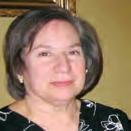
1965–66
And how about that satisfaction? Did you ever get it?
Maryann Collins writes, “ I’ve been thinking about Reed and the Rhododen dron Test Gardens. I moved from Chicago to Skokie, Illinois, last year, where I have a beautiful Miss Kim rhodi in front of my house that is doing very well in spite of our horrid weather. While I miss the abil ity to walk to restaurants and shops in my old neighborhood in the city, my knees are grateful for the one-story house I’ve moved to.”
John Cushing taught a class on how to play the penny whistle at the 2022 reunion; he gave away 24 whistles.
Alexandra (Heyman) Hopkins writes, “At Reed, I was a Soc major, and that served me well in jobs in socioeconomic/
marketing research. The skills in speaking, writing, and critical thinking that I devel oped in two years of Hum and Marvin Levich’s Philosophy of Science class were also key to success in my research/writing career. I can’t say that the philosophy that I studied in humanities had meaning for me. But later in life, I developed an inter est in the ultimate nature of reality. Now, I’m interested in what Plato had to say! This interest also led me down spiritual paths and to a study of quantum physics. At Reed, I never took a physics class and almost flunked out of calculus. But I’m now into my second year of calculus and have written an online encyclopedia of
clockwise from top-left: Four generations of Lehr men: Marvin Lehr ‘54 holds his first great-grandchild, Emil Lehr, flanked by his grandson Janek and son Ted.


Peter Langston ’68 with band, 3 Play Ricochet, before the pandemic.

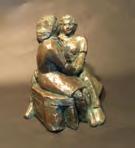
A Miss Kim rhododendron in front of the house of Maryann Collins ’67.
A bronze by Joan Rudd ‘69 (also pictured).
quantum physics for lay people (Quan tumPhysicsLady.com). I find that if I study calculus and physics at a snail’s pace, I can understand them. I’m now writing a book about quantum physics for a general audience. I’m married with two grown children and a new grandson. Life is good!”

The music camp that Peter Langs ton helps run, known as the American Banjo Camp (AmericanBanjoCamp.com), may possibly return to an in-person exis tence this September. If so, it will offer classes, demonstrations, concerts, and jams in old-time banjo (aka clawham mer) and bluegrass banjo (aka Scruggs or three-finger style), as well as guitar, fiddle, and mandolin. “I suspect I may be the only Reedie at the camp, but I’d love to be proven wrong on that!” Mean while, Peter has been experimenting with assembling individual cell phone videos into ensemble performances while wait ing to be able to start performing in per son again; there are a couple of examples on his website (www.langston.com).
Jon Moscow and his son David Moscow have coauthored the book From Scratch: Harvesting, Hunting, Fishing, and Forag ing on a Fragile Planet. Jon cohosts the Ethical Schools podcast (ethicalschools. org), which has passed 101,000 lis tens; he’s also a supporter of and occasional contributor to A Correction (acorrectionpodcast.com), an economics podcast hosted by his son Lev Moscow. Pat Sterner and Jon have celebrated being married 48 years and together 53; they now have three grandchildren ranging from 4 months to 4 years. (See Reediana.)
Joan Rudd is an independent sculp tor living and working in Seattle, Wash ington. She’s recently published a book, Building Solid: A Life in Stories (See Reedi ana), and completed a sculpture named (after the Yiddish proverb) Ibergekumine tsores zaynen gut tsu dersteyln “Bygone troubles are good to recount.”
Jeffrey Kovac had an essay, “View from the Mesa,” published in the webonly section of the American Scholar , the magazine of Phi Beta Kappa. You can find it at theamericanscholar.org/ view-from-the-mesa.
Margot (Voorhies) Thompson had an exhibition, Colors from the Outback: Joshua Tree, Borrego Springs, Summerlake, Hart Mountain, at Russo Lee Gallery this past April.
Katherine Verdery retired from the Graduate Center of the City University of New York with a big party, including her colleagues and a number of the students she has mentored there. (Previous jobs were at Johns Hopkins and the Univer sity of Michigan.) In true anthropologi cal style, the party included much to eat and drink. Indicating her eminence in her field, her papers will be housed at the Smithsonian Institution’s anthropology collection—a testament to her Reed edu cation. She follows in a long line of Reed anthropology graduates, taught (in her case) by David French [1947–88], Gail Kelly [1960–2000], and Claude Vaucher [1963–94]. Among the classmates she is still in touch with are linguist Victor Friedman , sociologist Susan Kinne ‘71, and lawyer Kathleen Pool, as well as former roommate Carla Saiger. And among her favorite memories are folk dancing every week, a likely precursor to her choice of an anthropology major.

Andre’ S. Wooten has published a video looking at 4 billion years of cli mate change and how the Ice Ages affected human history, with a focus on Africa and Africans. Search for “African World History 2022” on YouTube. (See Reediana.)
David Comfort’s most recent publica tions in literary magazines: “The Glorious Sufferings of the Literary Immortals” in the Montréal Review, “God’s Trimesters: His Infancy, Adolescence, and Adulthood” in Free Inquiry, and “The Disciple Employ ment Questionnaire” in the Satirist.

Sibylle Hechtel has been on the move! After finishing her 26th year teaching skiing (part time) for Vail Resorts this spring, she went to Puerto Rico for rock climbing, kiteboarding, and bird photog raphy (see her photos on Facebook). Next, she moved from Boulder, in the hot, dry Front Range, to outside of Telluride, in the San Juan mountains—about 2,500 feet higher and, so far, several degrees cooler. She plans to apply for a job teach ing skiing at Telluride Ski Resort.
On April 5, Robert F. McCullough testified before the U.S. Senate on oil and gasoline prices. You can find his testimo ny at commerce.senate.gov.
Edward Peters and Ariel Mieling ’05 led a “Life after Reed” discussion with current students about how planning and constructing K-12 learning environ ments aligns with Reed’s “Communities of Purpose.”
Katherine Verdery ’70 on the Reed alumni trip to Sicily. Sibylle Hechtel ’72 went rock climbing in Caliche, near Ciales, in Puerto Rico.In her new book, Project Escape, Lucin da Jackson continues her story that began in Just a Girl: Growing Up Female and Ambitious, exploring the uncertain ties women (and men) face in moving on from demanding careers. (See Reediana.)
Eleni Zatz Litt recently retired from a long career in higher education (most recently as associate provost at The New School). “Happily I can now spend more time with my family and friends, expand my art teaching and studio practice, and give back to my community.”
Wendy Myhre just got her second bronze sculpture, WindCaller, accepted into the 2022 SculptureWalk, which includes a year lease on display in down town Sioux Falls, South Dakota. Unfor tunately it is too cold to visit the sculp ture in the winter, and she now lives in Arizona.

Here’s some recent stuff that’s hap pened to Bronwyn Carlton: The Guard ian newspaper in England published a nice little article about how she met her husband, the noted hardcore art ist Sean Taggart. “The reporter was very nice, but it’s kind of funny how she had to make us sound more British.” Also in March, Bronwyn got an on-screen “spe cial thanks” credit on the new film The Batman, and she was a guest of Warner Bros. at the world premiere at Alice Tully Hall and at the cast-and-crew after-party at Tavern on the Green in Central Park. “So that was fun.”
Alexander Gourlay and his late mother, Patricia Gourlay, published a brief article in Notes and Queries pur porting to be the definitive explanation of the mysterious references to “Widow Dido” and “Widower Aeneas” in Act 2 of Shakespeare’s The Tempest. The lines involved had troubled him when writing his senior thesis at Reed, just as they have baffled dozens of editors and scholars; most productions of the play cut the lines because they seem to be nonsense. The Gourlays propose that a cynical character mocks a reference to “Widow Dido” by pronouncing it as “We do Dido,” where upon his cynical companion suggests a much naughtier pronunciation of “Wid ower Aeneas.”
1975–76
Let’s do the Time Warp again!
Alison Butler was thrilled to be elected to the National Academy of Sciences in May. “My education at Reed is where I learned how to learn and discover! These were no easy days at Reed, but they paid off over and over again as I was remind ed on my election to the NAS. My Reed education has stayed with me through out my research and teaching as a pro fessor of chemistry and biochemistry at UC Santa Barbara.”

Rachel Klevit was recently named to the American Academy of Arts and Sciences. Rachel is a professor of biochemistry at the University of Washington and is noted for her work on molecular recognition.
After teaching at UC Santa Barbara for 30 years, Chris Newfield has moved to London to be director of research for the Independent Social Research Foun dation and is very happy to be support ing research into large global problems across the humanities and social sciences.
1980

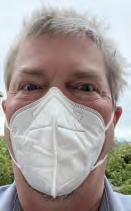
Geordie Duckler is a proud Reedie who was the creator and director of the short film “Worst Love,” filmed on the Reed campus in 1980 and shown several years afterwards as an honored Reed tradi tion. Geordie transferred his second year and obtained (a) bachelor’s degrees from Oregon State University, (b) a master’s degree from the University of Oregon, (c) a law degree from Lewis and Clark, and (d) a doctorate from UCLA. He has since become a fairly well-known law yer and scientist specializing in animal law cases. Although Geordie has had numerous scientific and law review arti cles published over the last 40 years, he just had his first actual academic book published this year. (See Reediana.)
Steve Lindsay got talked into a three-year stint as chair of psychology at the University of Victoria; he’s now got only two years to go. “Aside from that and the pandemic, the politics to the south, the climate crisis, the wars in
clockwise from top-left
Wendy Myhre ’73 and WindCaller on a balmy day in South Dakota.

Alexander Gourlay ’74 has an explanation for those odd references to “Widow Dido” in The Tempest
Geordie Duckler ’81 had his first academic book published this year.
Steve Lindsay ’81 models a KN95.

If you’re in Northeast Portland, you might see Kelly Kenison Falkner ’83 cleaning up the streets with this custom trash rig. (Thanks, Kelly!)
Eleni Zatz ’73 recently retired from a long career in higher education.
Ukraine, Sudan, Somalia, Ethiopia, and Yemen (and the more general problem of male violence), things are great.”
Jimmy Falkner moved back to Port land on March 1, 2021, in the thick of the pandemic, with Kelly Kenison Falkner ’83, after 38 years away. “The pandemic allowed Kelly to telecom mute as the director of the Office of Polar Programs at NSF, and my piano and guitar students had essentially dried up throughout the pandemic, so we were free to leave Virginia. We hit the ground running, and in our first year we have renovated our 1915 craftsman home in NE Portland, young compared to the 1816 townhouse we left in Old Town, Alexandria, Virginia. Still having no music students, I’ve been working construction with Will Neuhauser ’81 and his brother-in-law, Hamilton Byerly, brother to Laura Byerly ’83. My newest vocalizations during construction work can only be described as ‘grunting like an old man.’ Kelly is finishing up her federal government career at the State Department in the area of international science research, cooperation, and secu rity. In addition to working East Coast hours, Kelly has taken on the great task of reducing litter in Northeast Portland neighborhoods. I am following in her footsteps but a bit more lightly. Retire ment is on the December horizon.”
“Thanks to the organizers of the online wing of the 40th reunion,” says John Morillo. “Nice to see some people I had not seen in almost 30 years, and amble through the many submitted pic tures of good times in the last century.”
Rabbi Natan Margalit has written The Pearl and the Flame: A Journey into Jewish Wisdom and Ecological Thinking
He credits friend and classmate Samu el Fromartz ’80, editor-in-chief of the Food & Environment Reporting Net work (FERN), with help and encourage ment in the early stages of writing this book. (See Reediana.)
1983 40th reunion
MacNaughton residents Gary Wolf, Tim Lenderking, Mark Alexieff, Jim Car penter , and sometime denizen Matt Mahoney convened for a few days of in-person camaraderie in the Wasatch. Says Jim, “The skiing was good, Mark’s cooking was very good, and the stories and bridge were the best.”

Diana Bolsinger completed her PhD at the LBJ School of Public Affairs in May 2022. Diana will continue in her position as director of the University of Texas at El Paso’s graduate program in Intelligence and National Security Studies.
In 2015, Diana Miller Sauerhaft was diagnosed with ovarian cancer and learned that she had inherited a BRCA gene mutation. Both men and women can inherit such harmful vari ants, which are associated with a high er risk of breast, ovarian, and other cancers. People of Ashkenazi Jewish descent have a 1 in 40 chance of hav ing an inherited BRCA gene mutation. If you have a family history of breast or ovarian cancer or are of Ashkenazi Jew ish descent, whether you are male or female, Diana would encourage you to talk to your doctor about genetic test ing. If you know you have inherited a harmful variant, you can take steps to reduce your cancer risk.
1985–87
Rome and Carthage sign treaty ending Third Punic War, a mere 2,134 years after it began.
Since graduating from Reed, Chris Hagerbaumer ’s major adventures have included a stint in the Peace Corps (Palau); working for a judicial reform organization in Chicago; earn ing a master’s in public policy at Uni versity of Chicago; returning to Portland because, despite being a fantastic city, Chicago’s too far from the wilderness; marrying a low-maintenance fellow with a quirky sense of humor; enjoying travel and the great outdoors; being the proud auntie of nine nieces and neph ews; advancing environmental policy for 23 years at Oregon Environmental Council; leaving that job just as the pan demic hit, which required a pivot to con sulting; and, in March of 2022, taking the helm of OpenAQ, a nonprofit that aggregates and harmonizes disparate air quality data from sources around the world on its free, open-source data platform so that researchers, commu nity advocates, journalists, and other changemakers have access to the data they need to build the case for clean air action. Despite her angst about the state of democracy and the existential threat of ever more pollution, Chris remains a stubborn optimist.
RIP Lucille Ball. 1990
David Messner is serving a church west of Philly. Dave finished his PhD at Emory and is teaching ethics and social justice at Jefferson University. He and
 Left to right: Matt Mahoney, Mark Alexieff, Tim Lenderking, Gary Wolf, and Jim Carpenter, all class of ‘83, together again in the Wasatch.
Left to right: Matt Mahoney, Mark Alexieff, Tim Lenderking, Gary Wolf, and Jim Carpenter, all class of ‘83, together again in the Wasatch.
his wife Jennifer just celebrated their 26th anniversary and the joy that their kids are both out of high school.
Princeton University Press has published Maria Heim’s Words for the Heart (See Reediana.)
During the pandemic Shula (Jill) Neuman picked up five hobbies: knitting, meditation, sword fighting, playing gui tar, and time traveling. She is still enjoy ing the meditation.
Khristina Haddad was promoted to full professor this spring. She is the chair of the political science department at Mora vian University in Bethlehem, Pennsylva nia. “Thirty years after graduating, Reed is still near and dear to my heart and mind. I’d like to express my deep gratitude to Professor Darius Rejali [poli sci 1989–2020], who made all the difference for me in my education even before I fully understood what it means to be an eth nic minority in the U.S. and long before the terms diversity, equity, and inclusion became so central to higher education. Darius recognized me, taught me, sup ported me, and mentored me throughout my academic career. پروفسور رجالی، از شما بسیار سپاسگزارم. (Thank you very much, Professor Rejali!)”
The new book by Joseph Orosco ’92, professor of philosophy at Oregon State University, looks to Star Trek as inspira tion for a more just and humane future. (See Reediana.)
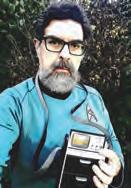

Proving no Reedie path can be too nonlin ear, Jenn Falco began an apprenticeship in classical Pilates taught by second-gen eration master teacher Dorothee Vande Walle in Seattle, Washington. At the com pletion of her 700-hour teacher training program, Jenn plans to help friends and family worship the core gods with pre cision, flow, and a great deal of humor.
After 5 years at UMass Chan Medical School, Heinrich Gompf is glad to be back in California and back at UC Davis! “Still doing sleep research, just in a differ ent setting that will hopefully prove to be more productive.”
Thought extinct for over 100 years, crested geckos “rediscovered” after tropical storm. What would you like to rediscover?
Brandon Barnett, electronic resourc es librarian at Multnomah County Library in Oregon, has been appointed to the state library’s Statewide Database Licensing Advisory Committee (SDLAC). She will represent the category “Public Library Serving over 100,000.” SDLAC makes decisions about how to spend federal and other monies on e-resourc es for statewide access for all Oregon libraries.
Robin Scher has been working on a series of stop-motion animations star ring Lego Darth Vader recreating famous movie scenes. Check it out on the You Tube channel “Allen Walker, Actor.”
In her 26th year of teaching, Catherine Borek was honored with Teacher of the Year for Compton Unified School District. She started teaching English at Domin guez High School after graduating in 1996. The knowledge and curiosity that

Reed gave her is now passed on to her students each year.
Joshua Lerner has joined WilmerHale’s office as partner in San Francisco.
1998 25th reunion RIP Grandpa Jones.
Frederic Bahnson’s new book will help you make better life decisions. Kirkus says, “Get it.” (See Reediana.)
“It’s been a long and winding road through many different corridors of aca demia (with a brief stay in the advertis ing industry),” writes Victoria Elmwood “But finally, after two master’s degrees, a doctorate, and multiple career changes, I earned tenure as an academic librar ian at Loyola University New Orleans. I love working at an institution that, like Reed, values small class sizes and sees social justice as part of its institutional
clockwise from top-left
Katie Connolly ’00 sent us this photo of Reedies and associates enjoying the Memorial Day beach gathering hosted by Ryan Offutt ’00 and his husband Alex.
Joseph Orosco ’92 looks to Star Trek as inspiration for a more just and humane future.

Congratulations to Catherine Borek ’96, Compton Unified School District’s Teacher of the Year!
Acacia Parks ’03 in her first week at Found, alongside her fellow company leaders: CEO SJ Simmer, COO Swathy Prithivi, CPO Alex Linares, and CMO Rekha Kumar.
mission. It’s gratifying to teach students how to understand knowledge produc tion at its core, as well as to equip them with strategies for resisting mis- and disinformation.”
Over Memorial Day weekend, Ryan Offutt and his husband Alex hosted a gathering both spectacular and relaxing. Fifteen adults, 10 children, and 3 dogs enjoyed the trees, the swallows, the trout, a 24-hour bonfire, and the end less stars of the Overkill and Underkill of Lew Beach, New York. In attendance with their families were Katie Connolly [whom we thank for this note and the accompanying photo], Lena Eberhart ’01 (and husband Erik Lieblein, ardent reader of this magazine), Macky Futhey ’99, Miles Norton, Sam Schaeffer ’01, and Toby Sheppard Bloch ’98. Missing because of last-minute happenstance were Bradley Black and Dan Hammer Most cherished of all was Kathy Offutt, Ryan’s mom.
George Alderson ’63 let us know that Melanie Barnes was appointed as the Bureau of Land Management’s state director for New Mexico. (George spent 8 years in the BLM, so he keeps an eye on these things.) Melanie has worked for the BLM in New Mexico since 2007. Con grats, Melanie!
Travis Greenwood is thrilled to reveal that he’s joined Leatherman’s marketing team, where he’ll be working on email, retention, and loyalty projects. “While the decision to leave my previous employer of 4 years wasn’t made lightly, the opportuni ty to join a global brand that continues to design and manufacture its best-in-class multi-tools here in Portland was too good to pass up. As far as I can tell, I’m the only Reedie currently employed at Leather man—but naturally I’d love to change that and I’d encourage folks to reach out at travis.greenwood@leatherman.com if they see a fit on the company’s job board or have an interest in e-commerce.”

In May, after nearly a decade of obses sive work, Kimber Nelson obtained a Professional-level Track & Sign certifi cation in identification and interpreta tion of the evidence of wildlife presence and behavior through Tracker Certifica tion North America. She’s been applying this skill to community science projects documenting rare carnivores in Oregon, while continuing her paid work as a fam ily medicine clinic nurse.
2002
Cow of the Year (we’re calling it!) Cincin nati Freedom jumps six-foot slaughter house fence, eludes capture for 11 days, is adopted by Peter Max, and finds perma nent home at New York animal sanctuary.

During the pandemic, Nick Blake taught himself how to code by building video games. As a result, he recently released a Game Boy–style video game (yes, it runs on Game Boys) and made a PC version as well for gamers who want to enjoy a retro-style game.
After 10 years at Happify Health as their chief science officer, Acacia Parks moved to tech startup Found as chief behavioral health officer. She delights in the chance to sit on a female-dominated leadership team that strives to carve out a best-in-class, comprehensive weight care platform that tackles both biology and behavior change. She works remotely from the woods of northeast Ohio, where she lives with her partner, her almostnine-year-old, and a ton of chickens.
Ashley Bowen and her partner Adam Maceika welcomed their daughter, Ivy Grace Maceika, on March 5, 2022. After
a few days in the NICU, she’s now thriv ing like the plant they named her after.
Ariel Mieling visited in mid-April to help Ivy’s parents adjust to life with Ivy and to reminisce with Ashley about 20 years of friendship.
Ariel Mieling and Edward Peters ’72 led a “Life after Reed” discussion with current students about how planning and constructing K-12 learning environ ments aligns with Reed’s “Communities of Purpose.”
2006
C.R. Foster’s short story “The Rain Artist” was selected as a notable story for the Best American Science Fiction and Fantasy 2022 anthology by editors Rebecca Roanhorse and John Joseph Adams. Originally pub lished in O: The Oprah Magazine, “The Rain Artist” imagines a future in which rain is a valuable commodity enjoyed only by the ultra-wealthy. The anthology hits book shelves on November 1, 2022.
2007
“I don’t know who I am, but they’re after me.” —Karl Rove
2008
In June, Kristine Luque graduated with her MBA from Oregon State University with an emphasis on digital marketing. She is currently working at tech/market ing company G5 in Bend, Oregon.
clockwise trom top left
Nick Blake ’03 asks: Will YOU be the Champion of Legend who defeats the Dragon King?
Leatherman Day 1 welcome kit for new marketing team member Travis Greenwood ’01.
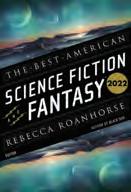
C.R. Foster’s short story “The Rain Artist” was selected as a notable story for the Best American Science Fiction and Fantasy 2022 anthology.
From left: Ashley Bowen ‘05, Adam Maceika, and new family member Ivy Maceika. Photograph taken by Ariel Mieling ‘05 during her visit in April.

Kritish Rajbhandari ’12 got married to Brandie in her hometown of Macon, Georgia, with many Reedies in attendance.
Cancy Chu ’15 took a look at a book while working as an assistant conservator at the Powerhouse Museum in Sydney.

Jamie, son of Nick Pittman ’13, turned one in June!

Congratulations to new fiancées Jacey de la Torre ’20 (left) and Melissa Molloy ’19. (Photo by Nina Johnson.)
After a meandering trajectory that took her from Portland to Ankara, Turkey, then Berlin, Germany, for her MA and PhD (and a total of nine years outside the U.S.), then Chicago for a postdoc, Ursula Moffitt is moving to New England this fall to start a position as an assistant professor in developmental psychology at Wheaton College, Massachusetts.
2009
Nick Silverman was named as one of the five under-40 white-collar defense law yers to watch by Bloomberg Law. Nick practices law at Steptoe & Johnson LLP in Washington, DC.
2010
Jessamyn Fitzpatrick will be starting grad school in the fall at NYU Tisch for an MA in performance studies, exploring the ways that we can use theatre and per formance to rewrite our sexual scripts and create better conditions for pleasure equity. She has spent the last several years touring a sexual assault prevention show, rocking crop tops, and writing poems.
2011
Neptune completes first full rotation of the sun since its discovery in 1846. (Almost like finishing your thesis!)
2012
Kritish Rajbhandari got married to Brandie in her hometown of Macon, Georgia. Reedies Sandesh Adhikary ’15, Mischka Moechtar, Cris Panda, Alok Amatya ’10, and Aashis Thapa ’15 were in attendance.

Arianna Rebolini sold her book, Bet ter, to Harper Wave, publication date TBD. Better is a life-affirming memoir/investi gation into suicide, family genealogies of mental illness, and the cyclical, crooked path of healing, that asks, with new
urgency after the birth of her son, how we get better for good in a society that values us by our productivity.
2013 10th reunion

Nick Pittman’s son Jamie turned one in June!
2014
Bots outnumber humans on the internet for the first time in history.
2015
Cancy Chu will be back in the U.S. for a year starting September 2022 on the inaugural Fulbright-National Archives Heritage Science Fellowship. She will be spending this very exciting time research ing conservation treatments for synthet ic papers in book collections. Special thanks to Geri Ondrizek [art], Rebecca LaLonde [chemistry], Gay Walker ’69 [library 2002–17] and other wonderful mentors who set her up for a path in cultural materials conservation. Cancy misses the wild and bright Reedies and hopes to see some of you in person soon!
2016–17
You are more likely to believe a state ment that is printed in bold.
2018 5th reunion Water discovered on Mars.
2019 Look down!
2020
Jacey de la Torre and Melissa Mol loy ’19 got engaged twice during Reed Reunions 2022! Jacey proposed to Melis sa on Friday, June 10, at the Ponderosa Lounge and Grill in Northeast Portland, and Melissa proposed to Jacey at the Crystal Springs Rhododendron Garden across the street from Reed on Saturday, June 11. They were thrilled to celebrate with their chosen family from Reed and are excited to begin planning their wed ding in Iowa next summer.
2021–22 Don’t look up!
Sally Watson ’50 March 11, 2022, in Santa Rosa, California. “I suspect most Reedies are misfits,” Sally wrote in her unpublished autobiography, Who Me? “They feel like aliens, seem to have nothing in common with their ‘peers,’ and don’t even think in the same language.” But in addition to these, Sally had another reason for feeling “other.” When she was two, she was savagely burned in the face and neck by concentrated sulfuric acid. “Any species by instinct wants to reject one who is Different, even if their members don’t realize it,” she wrote. “There was little handicap to my movements—but it was as disfiguring as tha lidomide. More, in a way. The face is the seat of personality, and people are more offended if something’s wrong there. Other children were innocently curious, or teasing or unkind. Not nearly as bad as adults’ cold clinical disgust as to some slimy creature from the swamps.”
The eldest of five children born to William and Dorothy Watson, Sally was raised in a house perched atop a hill in Seattle. From her bedroom window she looked out over a mile of rooftops to Lake Washington.
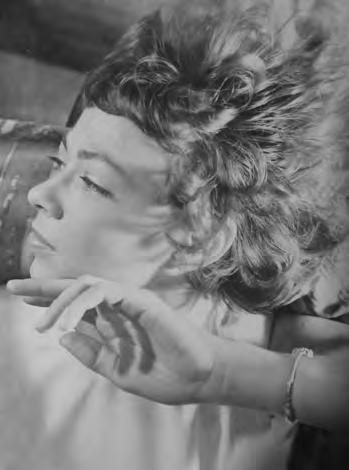
Pearl Harbor was attacked just shy of her 18th birthday, and Sally joined the WAVES (the women’s branch of the United States Naval Reserve), where she studied radio engineering in Astoria, Oregon. When the war ended, she attended Colorado State College of Education for three years, partly funded by the G.I. Bill. But the college was not to her liking. She rarely cracked a book and still pulled straight As. She wondered whether college shouldn’t be more challenging and began applying to transfer. Before applying, she’d never heard of Reed, but she was accepted and started at the age of 24 as a senior transfer in English. Before she could become a senior, she was told she had to take a little test called the junior qualifying exam.
“It turned out the little test was a 10-hour exam,” she said. “Questions like Interpret the sense of three of the following statements. Explain the critical point of view from which they are written and comment on the validity of the judgment in the light of your own understanding of the author or work involved, with specific evidence. Two hours. I could not have written one word in answer to one single question, and there weren’t any other details I happened to know. I looked at the benign professor, who flickered a quiz zical eyebrow. ‘Uh, how about I be a junior?’ I
suggested brightly. He smiled. ‘We thought you might feel that way.’”
At Reed, she discovered kindred spirits in the friends and professors she encountered. She also discovered a love for learning and discourse. “I realized that at Reed I had found my kind of people,” she wrote. “We thought the same things were interesting and important. You could have conversations, often laced with dry, subtle humor in class and out of it. Faculty and students alike produced witty phrases like ‘moral smugness’ or ‘the glorious lunacy of chivalric battle,’ or obser vations like ‘a Russian comedy is a play in which the hero dies happy.’ The more you knew, the better you could appreciate this kind of humor.”
She ambled around the Reed coffee shop listening to conversations, joining the ones she most fancied, about the new Mt. Palomar obser vatory, Sartre’s existential play No Exit, the Harry Hopkins papers, Arab armies trying to destroy the new state of Israel, or the unlikely new notion that the universe started with a big bang.
“Reed is what I wanted from the beginning— without knowing it,” she said. “Classes here are like daily miracles. It’s as though every class is a great door opening a little wider on a great and wonderful scene—horizon after horizon—that I never even knew existed.”
But she’d never studied so many hours in the day, and when it became overwhelming, she was
advised to take breaks from studying. “I’ve taken up knitting as one relaxant,” she wrote. “Mom’s style. You don’t have to look. So I can knit and read or talk—I even knit in class, and it’s okay so long as I’m fully participating. I’ve begun doing cartoons again—full page ones of whole scenes, like Ralph Berringer [English 1946–53] urging ‘Why not kick that around a little?’ to a horri fied, shocked, blank-faced table of pupils. Of Rex Aragon’s [history 1923–74] lecture to rows of bewildered kids: ‘—to simplify the problem, another way of theorizing the rational and material aspects of these essentially character istic elements of conflict and interplay between the rigid mathematical imposition of axiomatic theory and the endeavor to develop a process to facilitate the systematizing of experience—’ (I got that from his lecture, too. Couldn’t have thunk it up myself.)”
Sally wrote her thesis, “Passion Spins the Plot (an Analysis of the Conflict between Reason and Passion in Othello, Hamlet, and King Lear),” advised by Prof. William Alderson [English 1943–64].
After graduating, she worked in various places on the West Coast, including at MGM, where she handled fan mail and remembered seeing the young Debbie Reynolds walking around the lot in jeans with her lunch in a paper bag. But studio life was not a good fit for Sally. She much preferred the intellectual stimulation of helping to lead Great Books discussion groups and making lifelong friends in the process.
In 1953, upon learning that a friend had published a story in a children’s magazine, Sally decided to write a book for children. Perched on the edge of her bed facing a typewriter on a tiny table, she completed the first draft of her novel in three weeks and the second draft in another three. Set in 1745, Highland Rebel told the story of a spirited young girl living in Scotland during the Jacobite rising. Holt, a major publishing house, accepted the book without revision— very unusual for a first-time author. The cover illustration depicted a confident girl wielding a sword. The book was highly successful. Sally, who’d always known that she didn’t want to be a housewife or office worker, discovered what she did want to do. The next year she followed up with Mistress Malapert, another work of histor ical fiction about a girl who disguised herself as a boy in order to work with Shakespeare at the Globe Theatre.
In all, Sally created 10 books in what became known as the Family Tree series. Spanning three centuries in timeline, the stories always featured strong, opinionated heroines rebelling against the restrictions placed on females by society. Characters were often related by family, and some of the books contained a printed version of the complex genealogical chart Sally originally created in calligraphic script. She took great care to assure the historical accuracy of the times in which she placed her fictional characters.
“I was always interested in the kind of history they didn’t teach you in school,” she said. “I want to know what people thought and what they wore and what they ate for breakfast.”
The success of the Family Tree series allowed her to venture forth. “After three books,” she wrote in her autobiography, “I had enough money to go to Europe for five months. Three more books, and I went back to England for a year, studied Highland dancing, and wrote some more books.”
In 1957, Sally visited the young country of Israel and, struck by what she saw, wrote To Build a Land, about refugee and orphaned chil dren from around the world, traumatized by WWII, who learn to make a new life together on a kibbutz. Another two books followed: Israel: Other Sandals (1966) and The Mukhtar’s Children
(1968). Years later, she reworked To Build a Land and self-published it as a book for adults called The Return of the Exiles (2014).
For a time, Watson lived in Oakland and wrote while partnering with her mother, school teacher Dorothy Taft Watson, on a ground breaking audiovisual program that taught chil dren and adults to read through phonics.
In 1964, at age 40, Sally discovered that while her income would not allow her to live indepen dently in the United States, she could do so in England. She purchased a cottage in Hampshire, began painting with enamel on copper, sold her wares at craft fairs, and became a black belt in judo.
More than 20 years later, she left England for the California sunshine and purchased a little house in Santa Rosa, where she created a garden with fruit trees and a fish pond. Sally became a master gardener and joined a local group that fed and fostered feral cats.
By the ’70s, her books were out of print and library copies were being sold at exorbitant prices. Devoted fans around the world lobbied for them to be reprinted. In 2002, a small independent press (Image Cascade) decided to reprint most of her books. Lifelong fans were able to complete their collections, and new readers discovered her books for the first time. When fans created a LISTSERV devoted to her writing, Sally joined it (learning to use email in her 80s) and loved
exchanging thoughts directly with her readers.
Sally wrote a series set in ancient Egypt, more books in her series about English history, and two memoirs. Previously she had been published by major houses, but she was unable to find an agent or a publisher in a new publishing era. It became clear that self-publishing was the only solution, and in this unfamiliar milieu, Sally needed to function as her own editor, agent, and publicist. She worked meticulously, proof reading her manuscripts over and over, trying to get every detail just right. She had a glorious time writing the books and getting to know her characters. Sally had long been a loner, with a few good friends, but in her last decades she connected with her fans and was amazed to have made so many new friends late in life.
Like the heroines of her books, she cared little for societal expectations. From a very young age, she’d no desire to marry or have chil dren: “I wanted to have adventures!” she said. With her books, she nurtured generations of female readers (and male readers fond of good writing and exciting escapades) who learned about courage and unlimited possibility from her indomitable characters.
As she neared her 98th birthday, Sally mused often on what a wonderful life she felt she’d led; she’d done as she liked, and her life had been “gorgeous.”
May 31, 2022, in Walnut Creek, California, from cancer. Combining a cultivated intellect with his poetic tendencies, Sean gained renown for the smallbatch, idiosyncratic wines he fashioned at his Thackrey & Company winery, snapped up by oenophiles lucky enough to get their hands on them.
“My wines are like a person,” he said. “They talk, they change, they tell you something different every sip. They taste different from one day to the next, from one hour to the next. That kind of complexity is what makes wine interesting.”
He grew up in Southern California, the son of a journalist and a Hollywood script super visor. Deeply interested in art, he studied art history at Reed and took classes with Prof. Lloyd Reynolds [art and English 1929–69]. His Reed experience, especially the humanities sequence, remained an important part of his sense of himself. He was an editor of the Griffin his first year. After studying at the University of Vienna his sophomore year, he returned to Reed and then dropped out in 1962.
Two years later, he moved to Bolinas, Cali fornia, where he worked as a book editor for the
Sierra Club. With his long-term partner, Susan Thackrey, and Cynthia Pritzker, he opened an art gallery in San Francisco. Sean was an expert in 19th–century European photography, and the Thackrey & Robertson gallery was an
internationally recognized pioneer in the field.
In 1977, he planted some wine grapes in his yard in Bolinas and, relying on his intuition and the study of ancient winemaking texts, began to experiment with making wine. He
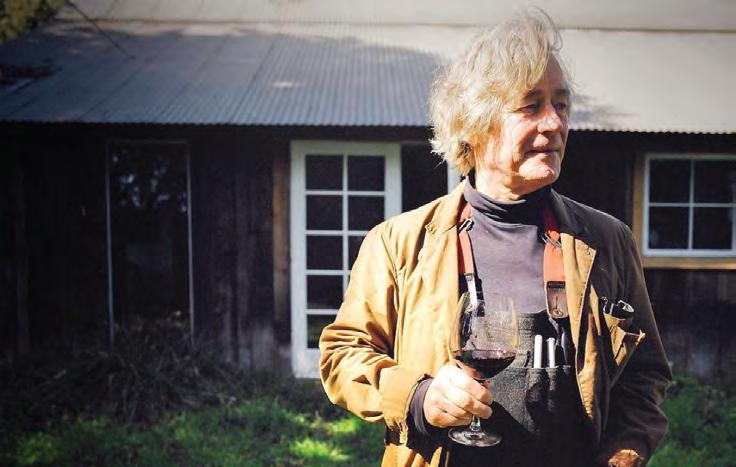
liked the results and began making wine from juice purchased from other growers. Eventu ally he became a bonded winemaker and took extension courses at the UC Davis College of Agricultural and Environmental Sciences. But Sean tended to look down his nose at scien tific approaches to making wine. Science, he felt, asked the wrong questions. As a winemaker, his role was to create pleasure. “You don’t have to get a degree in food science to be a chef,” he maintained.
Looking to the past for inspiration, Sean built a large collection of wine books and other manuscripts, known as the Thackrey Library, which included scores of centuriesold books, medieval illuminated manuscripts, and a sixth-century Egyptian papyrus. He trans lated and transcribed many of the publications, publishing them on his website for the edifica tion of an audience he estimated might number only in the dozens. This year, he sold the collec tion for $2 million.
In 1995, having developed a global following as a winemaker for brawny, expressive “editions” and wild blends named for constellations, stars, and galaxies, he left the gallery to make wine full time.
“Why drink a wine that you wouldn’t like if it were a person?” he asked, assailing Napa Cabernet and Bordeaux as being “too damn polite.”
Critics began awarding high scores to his wines, and Sean became famous for an uncon ventional, tech-free approach to winemaking. While most winemakers rush to crush freshly picked grapes in sterile, climate-controlled conditions, Sean let his grapes “rest” in the yard at least 24 hours after they were picked, an idea dating back to the didactic poem Works and Days (circa 700 BC) by the Greek poet Hesiod. Sean said the practice of letting grapes rest was commonplace in wine literature until the middle of the 19th century, and, because it’s a lot of work, the ancients must have thought it was accomplishing something useful. He fermented the juice in open-top vats beneath the stars and eucalyptus trees, the aromatic oils of which would invariably make their presence known in the bottle.
Adrienne Pfeiffer, who knew Sean for more than two decades, said, “He was 100% his own person, who lived on his own terms, with his own way of thinking, of living, of being. It was so inspiring to be reminded that you could free yourself from life’s constraints and live on your own terms. Life with Sean was really romantic.”
Wine writer Jancis Robinson said of Sean, “For his customers (many of whom were those same exasperated colleagues who could not deny the allure of his unique wines) Thackrey was the mad genius winemaker, a virtuoso char acter from another era, yet one who welcomed visitors from far and wide to his messy back yard on the coast, where they could lean up
against his old green truck and have a glass of something named after a part of the heavens.”
Sean is survived by former wife and long time companion Susan Thackrey.
Alita Cavender Roberts ’51
December 14, 2021, in Modesto, California.
At Reed, Alita wrote her thesis, “The Taft Policy in the Philippines,” advised by Prof. Dorothy Johansen ’33 [history 1934–84] and met her future spouse, Lyman Roberts ’51. She was a planning commissioner for the City of Modesto and was active on the Girl Scouts Muir Trail Council board of directors, served on the Christ the King Episcopal Church vestry, and was on the board of directors for the League of Women Voters of Modesto. Predeceased by her husband, Lyman, and her son, Keith, she is survived by her daughter, Lisa Winger.
March 3, 2022, in Hockessin, Delaware, from Alzheimer’s disease.
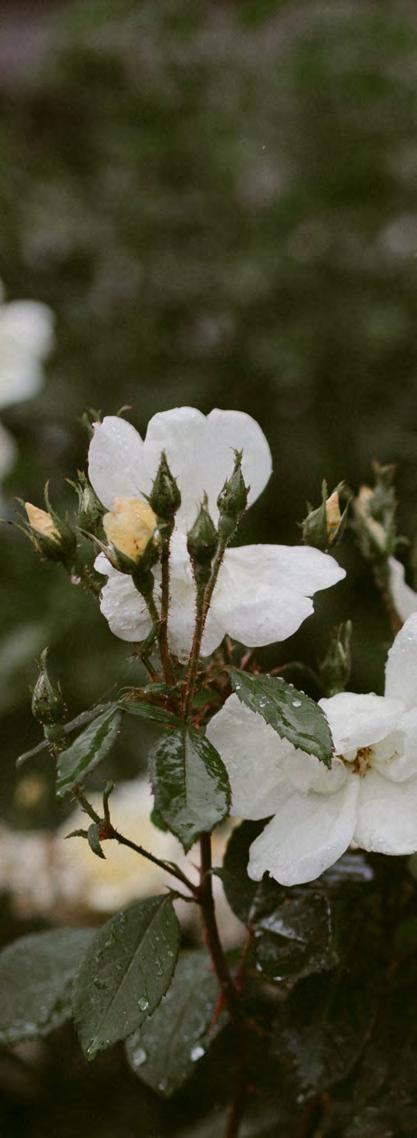
Dick was born in the Pacific Northwest, back packed much of the Cascade Crest Trail, and climbed most of the major mountains in the Cascade range.
At Reed, he wrote his thesis, “Glycine Metabo lism in Yeast,” advised by Prof. Arthur Livermore [chemistry 1948–65]. Dick went on to earn a PhD in chemistry/biochemistry from Stanford University, was a diplomate of the American Board of Toxicology, a fellow of the Academy of Toxicology Sciences, and had entries in Who’s Who In America, Who’s Who in the World, and Who’s Who in Medicine and Healthcare

Dick’s employment career began as a toxi cologist at the DuPont Company, where he managed the BioSciences group at Haskell Labo ratory for Toxicology and Industrial Medicine. He then worked as manager of the toxicology group at the Hercules Company. Upon retiring, he formed BioSante International, an indepen dent toxicology consulting company servicing clients throughout the world.
“Everything in this world except radiation is a chemical,” he wrote, explaining his life’s work in toxicology. “I feel that anything that contrib utes to the safe creation, use, and disposal of the chemicals that may become part of our daily life is a humanitarian contribution. Biochemi cally trained chemists are in a unique position to make that contribution. I was fortunate to have worked for two socially responsible, major inter national chemical companies. When I told them a proposed product was too toxic for its proposed use, and explained why, it was always dropped.”
During his retirement years, he and his wife, Ruth, traveled all over the world. At home, he
Honor your professors and classmates with a gift to Reed in their name. You can make Reed possible for the next generation.
IN THE SPIRIT OF REED
kept himself busy working with wood, leather, jewelry, and stained glass; fixing things; and figuring out how to keep squirrels out of the bird feeders. He also loved fishing, golfing, bowling, crossword puzzles, and sudoku.
Ruth died in 2017. Dick is survived by his four children, Joyce Farmer, Sharon Waritz, Gary Waritz, and Carol Buccio.
James B. Wade ’53
August 13, 2021, in Hood River, Oregon.
Born in Pocatello, Idaho, Jim was the youngest by 11 years of three chil dren. His father was in the insurance business and the family moved a lot. Growing up, Jim lived in Tacoma, Bellingham, Spokane, and Seattle. When he was 10, he traveled alone by train to spend the summer on his brother’s sheep ranch in Montana and was left in the care of his brother’s father-in-law. He lived in a sheep wagon with no running water or elec tricity while his brother and sister-in-law per formed as professional skaters in Cincinnati for the summer.
Jim’s family was of very modest means, which was complicated by the near death of his father from pancreatitis when Jim was 11. He began delivering newspapers, getting up at 4 a.m. every day to deliver the Seattle PI before school, a job that continued through high school. Even at Reed, Jim worked a paper route to supplement the income he received from working in the college’s boiler room to pay tuition.
In the eighth grade, he met Art Ratcliffe, who became his best friend and eventually his brother-in-law when the two married twin sisters. During spring break of his first year at Reed, Jim met Jacqueline Frost, a senior at the University of Washington, on a blind date set up by her identical twin sister, Jill, and her boyfriend, Art. Jim and Jackie hit it off and were married a year later.
He went on to medical school at the Univer sity of Washington. During his senior year, he joined the U.S. Navy and welcomed his first child, Vernon, into the world. Upon gradua tion from UW Medical School, he moved to San Diego for a medical internship at the U.S. Naval Hospital and then to Bethesda, Mary land, where he took an intensive course in psychiatry. Second Lieutenant Dr. James B. Wade was eventually stationed at the Great Lakes Naval Training Center near Chicago to do psychiatric screening of new recruits. His second son, David, was born in Waukegan, Illi nois. Jim transferred to the U.S. Naval Hospital in Oakland, California, where he practiced
psychiatry until 1961, when his naval service ended. He took a general practice residency in Martinez, California, where his third son, Andrew, was born.

He was invited to join a family practice in Hood River, Oregon, where he took up resi dency and also worked as the county’s medical examiner. During the 30 years he practiced medicine in Hood River, Jim learned Spanish so he might better serve the many Hispanic fami lies in the county, and willingly bartered with anyone unable to pay in cash. He was presented with an award from Radio Tierra thanking him for his many years of service to the Latinx community. Jim was instrumental in estab lishing a hospice program in Hood River, and served as the first medical director for Hospice of the Gorge until 2000, eight years after he’d retired from his medical practice.
He started the Hood River Yacht Club, served as Hood River port commissioner, and was active with his boys in Boy Scouts. Avid world travelers, he and Jackie visited 53 coun tries. They also sailed, were enthusiastic skiers, and were long-time members of St. Mark’s Epis copal Church. They later became active at River side Community Church, where Jim sang in the choir. He loved to sing and would burst into song at the slightest encouragement. Jim is survived by his wife, Jackie, and his sons, Vernon, David, and Andrew.
April 2021, in Milford, Pennsylvania.
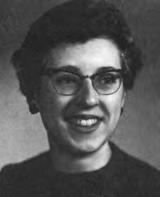
When she came to Reed from Salt Lake City, Martha Clapp (as she was then known) majored in literature and wrote her thesis, “Symbol and Value in E.M. Forster’s Novels,” advised by Prof. Donald MacRae [English/literature 1944–73]. Upon graduating, she went to New York City to make her mark. She taught art at Columbia Grammar School, worked as a writer and freelance artist, and wrote poetry.
One of her greatest accomplishments as an author was Alexander and the Magic Mouse, written as Martha Sanders. Featuring art by French illustrator Philippe Fix, the book was published in 1969 as a Weekly Reader Chil dren’s Book Club Edition and featured Alex ander, a smiling alligator from China; the old lady he lived with; and the new friends they made—including a brindle cat, a magical mouse, and a yak—when the town below them was threatened by 30 days of rain.
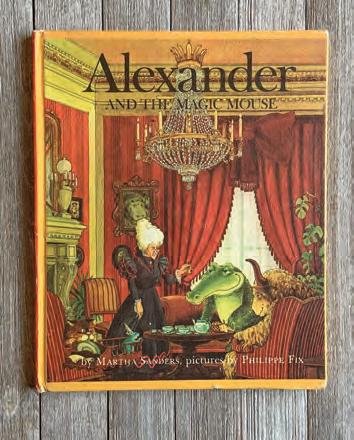
As Morgan Sanders, she created a weekly comic strip for a New York City community newspaper in the ’70s that featured the feline antics of Branwell E. Snit. It was inspired by a
real cat whose creative sleeping, gourmet sensi bilities, and passion for music were Morgan’s inspiration. The panels were later gathered into a single book, The Branwell Snitbook: The Complete Branwell Snit Cat Comix (2016).
She also wrote poetry. One of her poems was included in an anthology of works by contem porary female poets, and she published a collec tion of poems and drawings titled Looking for Lola: Poems & Drawings by Morgan Sanders
Morgan was a founding member of SOHO20, the second all-women cooperative art gallery in New York City. For her initial exhibition at SOHO20 in early 1974, Morgan showed threedimensional wall constructions that combined painting and found objects. Art critic Peter Frank praised the “progressions of dissimilar elements” as suggesting “a stream-of-conscious ness narrative, with rapid, exhilarating changes of venue.” The next year, Morgan exhibited four sets of photographs and three large paintings that depicted the aging interiors of turn-of-the20th-century architecture on the Upper West Side of Manhattan.
By the late ’70s, she turned increasingly to photography and began creating photographic series such as Harlem Walls , which showed at the New York Public Library, and Trucks , which exhibited at the Camera Club of New York and at the Viking Union Gallery in Bell ingham, Washington, shortly after she moved there in 1982. The following year, she showed a photographic series shot with a telephoto lens, Flowers and Stones, which was meant to be seen from a distance of 20 to 25 feet. In the words of one reviewer, the flowers “become the dipping and sweeping figures of dancers in flowing gauze gowns.”
She is survived by her brother, Dr. Robert Clapp ’62
Born in Philadelphia, Pennsylvania, Allan was the youngest of four children. The family lived above Blackman’s, the deli and ice cream store they ran that was famous all over Philly for the “Blackman dip,” the huge scoops of ice cream they served. After graduating from high school, Allan came to Reed, where he wrote his thesis, “An Investigation of Piaget’s Theory of the Development of the Concept of Right and Left in Children,” advised by Prof. Carol Creedon [psychology 1957–91]. He went on to earn a master’s degree in urban planning from UC Berkeley, where he served as president of the Berkeley Congress of Racial Equality (CORE).
An enthusiastic cyclist, Allen rode nearly every day of his adult life. He helped lead cycling tours in New Zealand and made many friends over the years taking reservations as a represen tative for New Zealand Pedal Tours. As a member of the Cascade Bicycle Club for more than 20 years, he served as the chair of the Advocacy Committee.
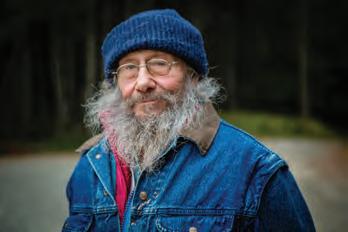

He was the author of Face to Face With Your Draft Board (1969) by the World without War Council, which was widely used by conscientious objectors and their counselors. In collaboration with his nephew, Neil, he also wrote A Thoughtful Conscience: Questions and Answers about Objecting to War, a book of the correspondence between the two. Allan counseled Neil on becoming a conscientious objector to the Vietnam War.
The majority of Allan’s professional career was as a planner at Group Health in Seattle, where he served as a program director in the graduate program. He was instrumental in the creation of the Master of Health Administration grad uate program at the University of Washington’s School of Public Health and was part of the ACT Health (now Kaiser Permanente Washington Research Institute) study to find ways to delay or prevent dementia and declines in memory and thinking. The study, which has been continuously operated since its start in 1986, is the longestrunning study of its kind, and Allen participated for many years. Of the roughly 6,000 partici pants, only 800 made provisions in their wills for their brains to be autopsied by the study. Allan was proud to be among those 800.
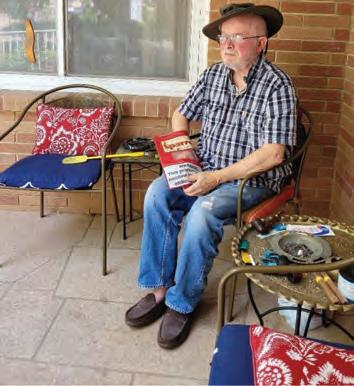
February 12, 2022, in Spokane, Washington, from heart failure.
Tom was born in Missouri and lived most of his formative years in Iowa. He came to Reed from Washington, D.C., where he graduated from Capitol Page School after serving as a page in Congress and previously in the Iowa state legislature.
Tom was active in student government and campus politics at Reed and lived in what he called “the Cardboard Castle,” the old FosterScholz dorms fashioned from World War II barracks, which stood above where the science buildings are today. He wrote his thesis, “British Political Elites: A Study of Selected Social and Political Characteristics,” advised by Prof. John Rue [political science 1958–60].
Tom also met his future wife, Jeanne Savery ’60, at Reed. Both came from Iowa, and Tom had hoped to meet Jeanne after seeing her picture among the incoming freshman photos at the college switchboard. They married while at Reed, leaving after Tom’s graduation to go to Michigan State University, where Tom earned a doctorate in political science and Jeanne completed a BA in psychology.
As a graduate student in Michigan, he met Gerald Ford at the 1960 state convention in Grand Rapids. At the time, Ford was interested in ideas for how he might “politely squeeze” Nixon to put him on the ticket as a running mate. Tom suggested that Ford try a lastminute effort to get write-in votes in Oregon as a way of raising his profile—an idea that got Ford’s attention but probably came too late. Over the ensuing years, one of Tom’s students rose to a position in the Ford White House, from where he would call occasionally for advice.
“He would ring me up and ask about this, that, and the other thing,” said Tom. “Our younger daughter would answer the phone and call down the hall, ‘Daddy, Daddy, it’s the White House calling.’”
Tom’s subsequent academic career was mainly as a professor of political science at Oakland University in Rochester Hills, Mich igan, where he taught for more than 30 years. Originally interested in “mathematical political science,” Tom gradually shifted his focus from the American government to international governments and politics.
He became a Fulbright Scholar at Jawa harlal Nehru University in New Delhi, India, during Indira Gandhi’s Emergency. He went on to tour India and southeast Asia, lecturing for the United States Information Service, then returning to the United States. In the mid-’80s, Tom served as special advisor to the adminis trator in the U.S. Agency for International Devel opment in Washington, D.C. In that position, he traveled across north Africa and into Turkey. He and Jeanne later spent time at the University of New England in Armidale, Australia.
They loved to travel, and one of their most memorable journeys together was dubbed the “Hum 11 cruise,” which took them to Venice and as far east as Odessa via Istanbul before concluding in Athens at the foot of the Parthenon. They later took the transatlantic cruise they had dreamed of since their under graduate days at Reed.
Jeanne preceded Tom in death. He is survived by his two daughters, Willa J. Casste vens ’82 and Margot L. Casstevens.
February 6, 2015, on Galiano Island, British Columbia, Canada.
Dan was born in Warsaw, Poland, at a time when anti-Semitism was on the rise. His family fled the country when Germany began bombing Warsaw on the eve of Dan’s second birthday. Dan’s father, Dr. Isaac Persyko, earned money practicing medicine as they traveled east on foot through the former Soviet Union. He was put to work as a prisoner of war doing labor in the Russian timber industry and then forced to work as a physician performing battlefield medicine on the front lines of the Russian army. Dan’s mother, Henia, found work caring for animals on a Russian circus train. Dan stayed with her and collected coal along the tracks to keep them warm as they traveled. Dan remembered his time on the circus train fondly, recounting how Lenia the elephant trusted him and came when he called her.
Allan Blackman ’58 May 1, 2022, in Seattle, Washington.Dan’s parents were reunited at the end of the war and moved back to Warsaw, where they found a destroyed city. Nothing was left of the vibrant community they once called home, so they resettled in Stockholm, Sweden, awaiting the quota system that would eventually allow them to emigrate to the United States in 1950. Dan’s brother, Art, was born in Stockholm, three months before the family left for America. Dan was 13 years old when he and his family sailed past the Statue of Liberty.
After a brief stint in New York, the family settled in Oceanside, California. To help support the family, Dan took on two paper routes that paid him $60 per month. This was the same as Isaac’s salary as a medical intern at the Los Angeles City of Hope Hospital. In 1955, the family became naturalized citizens of the United States.
A bright and eager student with an interest in science, Dan graduated with honors from Whittier High School and then attended Reed, where he majored in sociology, studied callig raphy under Prof. Lloyd Reynolds [art andEng lish 1929–69], and was introduced to Amer ican folk music by the college’s extensive music collection. He helped set up KRRC, the studentrun radio station.
For his final year, Dan transferred to Mexico City’s University of the Americas, graduating with a bachelor’s degree in sociology. He then traveled through North Africa and Europe, living in Europe until 1966. While in Europe, he took a correspondence course from the Berklee College of Music in Boston, fulfilling a lifelong dream of becoming a musician. Returning to the U.S., he moved to Seattle, Washington, and joined a rock band as a bassist.
In Seattle, he met Karen Warner, a Cana dian, and moved with her to Canada in 1967. Though he and Karen went their separate ways after a year and a half, Dan attained the status of “landed immigrant” in Canada and eventually became a citizen. He taught music and learned to make guitars in Vancouver, British Columbia, and moved to Galiano Island in 1969.
The next year, he met Francine Renaud on a ferry on the way to work at Seedpod, an instrument maker’s commune on Georgeson Bay Road. This meeting sparked a creative and family partnership. Music, arts, and crafts became their passion and a means for their family to grow; their daughters, Sarah and Tamara, were born on Galiano. The couple made a full and happy life on the island, making music and jewelry, growing a garden, and raising chickens. They became skilled at the identification of native plants, fish, and other wildlife; they canoed and hiked through the forest to forage for food; and Dan fashioned catamarans by lashing two canoes together. Avid hunter-gatherers,
they picked mushrooms, nettles, salal berries, salmon berries, and blackberries; dug clams and oysters, and harvested sea urchin roe and sea cucumbers from the Salish Sea. Dan was a scholar with a strong interest and curi osity about many aspects of the world around him, which he constantly explored. The family became loved and respected members of the island community.
Dan, Francine, and the kids traveled to visit her family in Eunice, Louisiana—the source of the music they loved and played together: Cajun and zydeco.
A man of many talents, Dan was skilled in the use of languages. In addition to English, he spoke Polish, Russian, Spanish, and French. He practiced the art of calligraphy and was a soulful musician. In his workshop by the water, Dan made and sold guitars and dulcimers, and later became a fine metal and bead jewelry craftsman, leather worker, and drum builder in that same workshop.
His final profession was as a one-man band, entertaining tens of thousands of people over the years as “Dan, the Man, the One Man Band,” including in front of the Empress Hotel in Victoria, British Columbia; in Australia; in San Francisco, California’s Union Square; and at Fisherman’s Wharf.
Among his greatest joys in life were sharing and discussing knowledge, music, and ideas with others and experiencing his relationship with nature and the universe. Dan believed that everything is connected and that separate life is always an illusion. For him, death was not the end. In his words, “consciousness doesn’t die when the brain dies, because it’s contained, among other things, in memory, in a social network and in culture.”
He once said he hoped that God would grant him many years of life in the paradise that he’d found on Galiano Island to make up for the horrors of war that he and his family experi enced as a child. Ultimately that did transpire; he found peace, community, joy, and love in his final resting place on Galiano Island.
April 18, 2022, in Seattle, Washington. A Portland native, Charles was on track to becoming either a policeman or a longshore man when a high school teacher told him he should apply to Reed. To put himself through college, he cleaned houses nights and week ends. He wrote his thesis, “Hare’s Refutation of Naturalism,” advised by Prof. Marvin Levich [philosophy 1953–94]. Because he was a day dodger who lived off campus, Charles wasn’t socially connected to classmates, but he loved Reed because it exposed him to the world, cul ture, and thought. He also felt greatly indebted to Levich, who served as his mentor.
Charles earned a PhD in philosophy from Cornell University and joined the faculty of
the philosophy department at the Univer sity of Washington in Seattle, later serving as chair of the department. He taught courses and published papers on topics including the philos ophy of mind and the history of philosophy. He held fellowships at MIT and the Pontificia Universidade Católica do Rio de Janeiro.
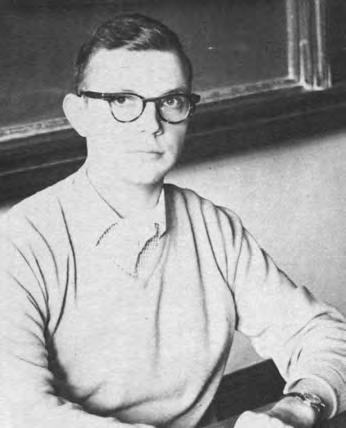
Chuck married Sandra Reinman, and they had one daughter, Diane Marks Langoria. Both survive him. Charles felt a strong connection to Reed and was a generous supporter of the college, saying, “I owe Reed a personal debt.”
March 21, 2019, in Portland.
Born in Portland, Suzan graduated from Lincoln High School and entered Reed’s joint program with the Museum Art School.
“Everyone seemed way more sophisticated than I and had glamorous, famous parents,” she remembered of her days at Reed. “Nonetheless, I prefer having been challenged in all respects than to have slid through a conventional school. Why, I was amazed to find there was a theory of theories! Unsettling, richly strenuous and soulful, Reed made me what I am.”
Suz went on to earn a master’s degree in social work from Portland State University, and for more than 20 years was employed as a social worker in various clinics by the State of Oregon before going into private practice. Some of her clients identified as transgender or transsexual at a time when few counselors were willing to work with them and most people didn’t know what transgender even meant. She also became a state-certified mental health examiner to civil commitment hearings in the Oregon state circuit court system.
A passionate and prolific visual artist, she worked with a variety of materials and collected odd and beautiful things—both natural and man-made—which she incorporated into shadow boxes, sculptures, and jewelry. Her
work was shown at many art galleries and venues throughout the Portland area.
Suz’s kindness and generosity were legendary; she rescued many friends from the streets and provided temporary lodging in her home. She had an extensive network of friends and business acquaintances and was adept at matching people with jobs and people with people. She died peacefully at home, following a courageous 15-year struggle with cancer, and is survived by her daughter, Andrea Izquierdo Tores.
March 12, 2022, in Granville, Ohio.
Raised in Columbus, Wisconsin, Seanna got a bachelor’s degree in general literature from Reed. For many years, she lived in Granville, Ohio, and worked in the Denison University Library. “Between books, videos, and the internet, I can go anywhere anytime, and as an added attrac tion, I am not confined to the here and now,” she said. She adored all things creative, had a particular fondness for holidays and family tra ditions, loved sports and music, and excelled in all things culinary, testing and sharing new recipes. Seanna believed chocolate was the fifth major food group.
She is survived by her children Loronah, Kerensa, Debne, and Stuart, and her sisters, Deborah Gillespie and Signe Holtz.
January 24, 2022, in Aptos, California, from kidney failure following a fall.
David was born in Palo Alto, California; his fam ily moved to Chico when he was 10, and he grad uated from Chico High School. He enrolled in Stanford University, where he majored in journalism and was the editor of the Stanford Daily his senior year. While working on the Daily, he met Anne Johnson ’67, and they married the week of his gradua tion. He began working as a journalist, but decided he’d rather be a teacher.
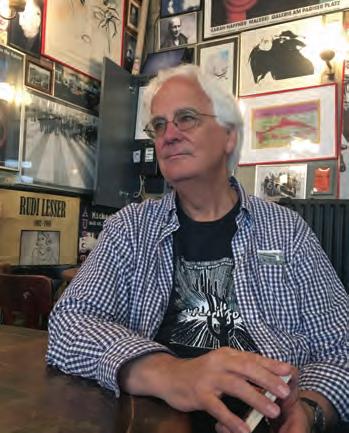
After obtaining his teaching credential in social studies, he taught for six years at a high school in Vancouver, Washington, and completed his master’s degree at Reed. During that time, David and Anne had four children: Megan, Peter, Matthew, and Jocelyn.
He was awarded a National Science Founda tion fellowship while teaching economics at the University of Washington and was then recruited to teach at Bakersfield Community College in California. David commuted to Los Angeles to earn his doctorate in administration at UCLA, and then moved into administration at Bakers field College, first serving as director of research and development and then as dean, handling the
college budget and personnel. He spent the last six years of his academic career as assistant chan cellor, personnel, of the Kern Community College District, overseeing three colleges: Bakersfield, Porterville, and Cerro Coso. He served as chair of the California Community College Research and Development Commission and represented the college district on the national Community College League for Innovation.
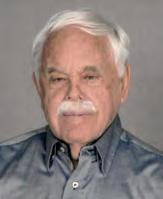
Although David was born blind in the right eye and with limited vision in the left, he loved to hike, swim, and camp with his family. Many days were spent camping in nearby Sequoia National Park. He was a leader in his church, and was the youngest elder ever elected in the Columbia Presbyterian Church in Vancouver, Washington. He was Kern County chair of the Eugene McCarthy presidential campaign and active in mission outreach to the homeless.
David stayed at the Baker Street homeless shelter once a month, caring for those who were there. In 2010, David and Anne moved to Aptos, California, to be close to their son and daughterin-law, Matt and Kirsti Scott, and their family. He became a member of Aptos United Meth odist Church, where he served as chair of the Staff Parish Relations Committee and member of the Missions Team, serving food to the homeless until his blindness became total. He is survived by his wife, Anne; and his children: Megan Scott-Kakures, Peter Scott, Matthew Scott, and Jocelyn Belt.
January 12, 2022, in Bozeman, Montana. Born in New York City, Robert grew up in Tucson, Arizona, which, along with the Sonoran Desert, became a major influence on his life and art. He graduated from high school and then stud ied at many schools across the country, includ ing Reed. Robert graduated with both a bach elor’s degree and an MFA from the University of Arizona and began teaching at the Tucson Museum of Art School, where he influenced countless students.
After marrying Joanne Stuhr in 1982, he took a position at San Diego State, and his first daughter, Alexis, was born two years later. He moved to Bozeman, Montana, where he was a professor of art at Montana State University. He found great joy in the outdoors, particu larly in the headwaters of the Missouri and at Yellowstone National Park. At the university he met his second wife, Gesine Janzen, and they had a daughter, Emeline, in 2006. Robert also gained a stepson, Henry Janzen, whom he loved and supported as his own.
Robert’s career as a painter, printer, and art professor spanned 50 years, during which time he collaborated with artists around the world and created a prolific body of work that was exhibited extensively, from Kyoto, Japan, to Willow Creek, Montana. He spent the last years of his life writing and self-publishing
books on his artworks with vignettes from his vast wealth of experiences. Robert is survived by his wife, Gesine; his children, Alexis, Henry, and Emeline; and his brother, Peter.
Jerene Kirkman Merritt ’72
February 23, 2022, in Hillsboro, Oregon.
Jerene Kirkman was born in San Diego in 1950; her father, Tom Kirkman, had a career in the navy; and her mother, Joan, was a professional com mercial artist. Jerene lived a peripatetic military family life with her sister, Laurie, and recounted a magical childhood of exploring creeks in Bucks County and tidepools in Virginia Beach. At the same time, it was difficult to establish roots. They returned to San Diego, where Jerene was active in service and science clubs at high school and played the viola in the orchestra.
She arrived at Reed in the fall of ’68 during a time of great social upheaval and unrest. Assas sinations of political leaders, the war in Vietnam, riots, and mass demonstratons challenged the status quo while the hippie movement ques tioned cultural norms. It was a tumultuous yet heady time for a young person. Reed offered
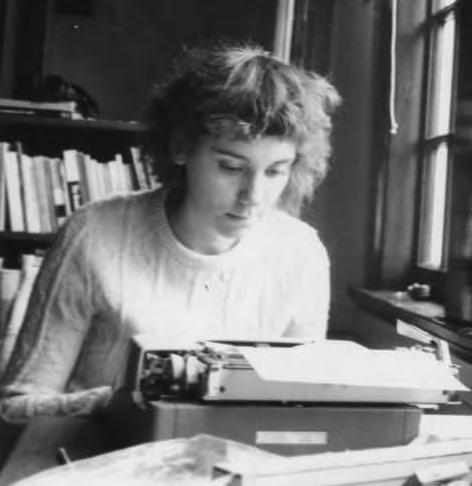 photo by Teresa Doane, courtesy of Andrea Carlisle
Contributed by Teresa Doane ’72
photo by Teresa Doane, courtesy of Andrea Carlisle
Contributed by Teresa Doane ’72
a student environment that eagerly explored these chaotic shifting perspectives while also vigorously challenging the values of an estab lished academia—all of which Jerene observed and partook of with passion. She occupied Eliot Hall in her senior year in protest of the escala tion of the Vietnam War, delaying the filing of her thesis, “Lingua Sublima Nabokov,” until fall, per the recollection of Jean Langford ’74, who protested alongside Jerene and other Reedies.
Some of Jerene’s most affirming experiences at Reed were classes with Prof. James Webb [English 1965–71], who gave space to and opened up the discussion of gender and women in literature—which was a rarity those days in academia and the wider world. At that time, gendered perspectives were not given due consid eration, and with regard to women specifically, prevalent thinking was that women had simply not accomplished anything of historical signifi cance. Webb was an iconoclastic teacher, and his probing, often scathing critiques of literary and socioeconomic norms and thinking confirmed for Jerene the value of the alternative perspec tive, which became her lifelong mode. Rooming off campus with the likes of pranksters George Lappas ’73, Demitri Sofianopoulos ’73, Ellen (Zatz) Litt ’73, and Jean Langford added yet other global and questioning perspectives on culture, psychology, film, and art, with a good measure of humorous hijink thrown in.
A literature major, Jerene served on the Reed film board, advocating for the works of foun dational directors such as Eisenstein, Renoir, Fellini, and Bergman. She also painted and hung posters for the weekly films; among her favor ites was one she painted for La Strada, featuring a skillful rendering of Giulietta Massina in the lead. Alumni may remember other artwork, such as a large mosaic banner of Jim Webb that hung in the canyon (and which she created in support of a Webb challenge to the community), and a medieval dragon she crafted out of paper maché and patchwork, then enlisting a crew to dance the dragon through a festive student throng in celebration of a long-awaited Portland spring.
When guerilla theater became an interest, she built and conducted a pop-up tollbooth at the exit of the main parking lot, at which point faculty and staff were invited to make impromptu exchanges with students. Another fond memory was spending Paideia foraging the Reed campus for edible plants, scoring nettles and horsetail. In the fall at the campus’s edge, she would gather chestnuts and walnuts, roasting them in the fireplaces of the Woodstock dorms. Through the years, the campus would continue to be a source of wonder for her, just as the many ideas and experiences that were introduced through classes and student life continued to be discussed and pondered throughout her years. After graduation from Reed, Jerene immersed
herself in the burgeoning women’s cultural move ment, working in bookstore collectives in Seattle (Madwomen) and Eugene (Mother Kali). With her friend Mary Narkiewicz, she explored a farming venture in Vermont, but winters proved too cold for her. Returning to the Pacific Northwest, she studied naturopathic modalities and completed an internship at Bastyr College, then in 1986 achieved her MA in counseling and psychology at Lewis & Clark. Her career path landed her in the Portland public school system, where she worked the remainder of her professional life until retire ment, first in the teen parent program, then, when that program was eliminated due to budget cuts, as the head clerk for enrollments and transfers.
In 1983, Jerene married Noel Merritt. She discovered he had a Reed connection: while she was focused on her studies, he had become a wandering, disaffected vet, sleeping many nights on the Reed lawn. They were to laugh at that many times, and to enjoy years of life together, traveling to Mexico and to Europe. They shared a love of books, and Jerene loved to read books out loud to her friends and family who were scattered over distances. In her last year, she privately published her father’s memoirs for his 95th birthday; before that she worked actively with family to create an honorary retrospective of her mother’s paintings at the Museum of Northwest Art in La Conner, Washington. Jerene contributed to many environmental and social justice causes; but above all she was ever the consummate friend, daughter, sister, and cousin.

She is survived by her husband, Noel; father and sister, Tom and Laurie Kirkman, as well as other family members; her dear friend, Mary Narkiewicz; and others of her close but wide circle.
January 25, 2022, in San Clemente, California.
“Pushkin Alias Evgeni: The Bronze Horseman as Autobiography,” advised by Prof. Douglas Herron [Russian 1972–76], and went on to earn a master’s degree in international business.
Fluent in English, Spanish, German, Russian, Serbo-Croatian, and Japanese, Frank had a successful career in the computer and software industry. In 1988, he was hired by Toshiba Computers America, which moved the family to San Clemente, California, from the Chicago, Illinois, area. He retired at age 55 and began pursuing his personal hobbies. An avid hiker and outdoorsman, he traveled to many famous hiking locations around the world, such as Machu Picchu, Mt. Whitney, and Mt. Everest, and was a talented photographer and video editor.
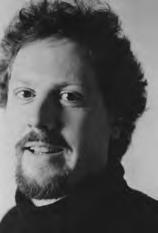
He is survived by his wife, Vesna; his two children, Richard and Rebecca; his sister, Jan Norton; and his brother, Rick Martin.
January 15, 2022, in Stuttgart, Germany, of stomach cancer. An internationally recog nized composer, John was the second of three sons born to Helene Hidden ’32 and Evans Van Buren. He attended Lincoln High School before starting at Reed. In his junior year, he trav eled to Stuttgart, Germany, to study German language and music, and ended up liv ing there for 50 years. He entered the Staatliche Hochschule für Musik und Darstellende Kunst (State University of Music and Performing Arts) in Stuttgart, where he studied composition with Milko Kelemen, piano with Edgar Trauer, and electronic music with Erhard Karkoschka.
As a composer, teacher, and performance coach, John’s life was music. He taught music composition, theory, and history at the Univer sity of Ludwigsburg near Stuttgart and was a professor for eight years at the University of Augsburg. He organized new music concerts in Stuttgart, and his compositions were performed on the radio and in concert halls in Europe and North America. His most played composition, Divertimento, was performed by the Eugene Symphony Orchestra, the Minne sota Orchestra, and the American Composers Orchestra at Carnegie Hall. His Momento was performed by the Portland Youth Philharmonic with Jacob Avshalomov conducting. His collab orations with choreographers and filmmakers led to productions on German television, on New York public television, at opera houses in Germany, and at important theaters in London and New York.
Frank was born in Detroit, Michigan, and grad uated from Reed with a bachelor’s degree in Russian and Slavic studies. He wrote his thesis,
John suffered a stroke in 2000, but, with some impairment, was able to continue living in his third-floor walkup apartment in the Stuttgart
neighborhood of Dan Cannstatt. He loved to travel, take in art exhibits, and visit friends and Portland family at their Oregon coast home in Tolovana. After another stroke in 2013, he moved into assisted living in Stuttgart. Though he could not travel as before, he continued his interest in sharing fine food and wine with friends. John had a keen wit and a caring spirit, and was generous with others to the end of his life. He is survived by his companion of 47 years, Margaret Schaal; his brothers, Evan and Mason; and his beloved goddaughter, Uli Fischer.
January 19, 2022, in Portland.
Chip was born in Kansas City, Missouri, and grew up in Waukesha, Wisconsin. At Reed, he wrote his thesis, “Rings of Real-Valued Continuous Functions,” advised by Prof. Hubert Chrestenson [math 1957–90]. He went on to earn a master’s degree in computer science engineering from the University of Wisconsin–Madison and worked for various technol ogy companies, including Tektronix, TSSI, Credence, and, in Portland, Maine, National Semiconductor.
His kind and gentle nature was exhibited throughout his life and in his volunteer work, including at the Regency Park Memory Care unit and at Lift UP, a local food pantry. Chip enjoyed reading, chess, astronomy, swimming, and tennis, as well as cross-country skiing, camping, and hiking. He is survived by Ana Marquez Brown ’78, his wife of 40 years; his son, Mark; his mother, Julia Ann Butler; and his sisters, Terry, Barbara, and Kathy.
Lafcadio Cortesi ’84
March 13, 2022, in Berkeley, California, Lafcadio died peacefully in his sleep at his home in Berkeley, California. The loss of his big heart, exuberance, buoyant energy, and joyous spirit left a huge void in his family, his community, and his friends around the world. He was a father, husband, brother, friend, son, leader, chef, dancer, singer, traveler—the type of person who, once met, was never forgotten.
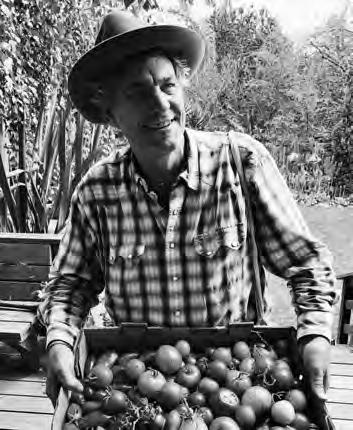
He grew up in Manhattan and attended Colle giate School and Milton Academy, meeting life long friends.
The Reed experience—his professors, fellow Reedies, and the Reed community—were influ ences with a huge impact on the trajectory of his life. Through shared multiple Reed houses— Mulberry Street, Reedway, PGE House (complete with green parrots living on the transformers)— classes, dancing at socials, travel, and more, he formed relationships with numerous Reedies, which grew into lifelong foundational friend ships. Indeed, it was at Reed where he met his soulmate and lifelong partner Jo Anne Welsch ’85 in Prof. Richard Tron’s [classics 1961–2003] section in freshman humanities. They grew up
together and married in 1989 after Lafcadio returned from Indonesia, gainfully employed at Greenpeace. They spent the next 40 years in love, creating a family and raising their two daughters, Arianna and Zephania, in Berkeley, California.
At Reed, Lafcadio studied religion, anthro pology, and political philosophy. His thesis, “Mircea Eliade’s Phenomenology: Expression and Practice of a ‘Theology of Meaning,’” advised by Prof. John Kenney [religion 1980–95], explored human experience of the sacred and profane through cultural expression in myths and rituals. In true Reed fashion, he took time off during college and spent a year traveling around the world with Jo Anne, starting in Nepal with Charlie Casey ’85, and continuing with a month in Thailand, Indonesia, China, and Italy, connecting with fellow Reedies along the way. When he was at Reed, Lafcadio was a constant force in the intellectual discourse, dancing, pursuit of live music, and “socializing” that made that time so special.
He was an enormously effective conserva tionist and community organizer who had an impact everywhere he worked. Lafcadio devel oped special expertise in Canada, Indonesia, and the wider Pacific. Beginning in 1985, he lived and worked in Indonesia with Volunteers in Asia on community development before joining Greenpeace in 1987, where he led efforts to support local communities in their struggles to keep their traditional lands and end defores tation in Papua New Guinea and the Solomon Islands. He played a leadership role in Green peace’s Pacific Campaign: a half-dozen catalytic actions defending forests, climate, fisheries, and coral reefs, as well as supporting local NGOs throughout the Pacific region. At Stand.earth, he was a director of Boreal Markets, fighting logging in thousands of square miles of the most ecologically and culturally important forests in western Canada. From 2008 to 2019, Lafcadio was director of Asia programs at the Rainforest Action Network, leading efforts to force paper buyers to shift to sustainable, human rightsbased policies. Most recently he was a senior corporate campaigner at Canopy Planet, where he led efforts to change environmental policies at major consumer fashion and packaging brands.
Lafcadio is most remembered for his passion and genius for bringing disparate groups together, navigating diverse cultures, and building consensus among people from different back grounds—all with compassion, patience, and joy. His persistence and sincerity, combined with his endearing and charismatic personality, made him an effective collaborator and friend among local communities, activists, allies, and even adver saries around the world. One friend noted after his death that “there are many forests standing in the world today that wouldn’t be there without Lafcadio’s efforts and charm.”
He was also an amazing connector and community builder weaving together his personal
and professional relationships, especially his beloved Reed friends. Back in 1995 as a Green peace campaigner, Lafcadio tapped friend and curator Larry Rinder ’83 to collaborate with the Maisin community in Papua New Guinea to create an exhibit of tapa cloth art. Jumping Lines: Maisin Art and Rainforest Conservation at the UC Berkeley Art Museum showcased how art, indigenous knowledge, and conservation are fundamental to protecting healthy forests and communities from logging companies hellbent on clearcutting these ancient tropical forests.
He also served on the board of the Karuna Foundation (Sanskrit for “compassion”), founded by Eric Lemelson ’81 , together with Lisa Danzig ’85 and Holly Pruett ’85, supporting visionary organizations in developing nations that help communities fight and adapt to climate change and protect ecosystems. He was a member of the boards of the Dutch Founda tion for Ecological Cooperation and the Sustain able Fisheries Partnership.
Lafcadio loved to cook good food, and he honed his skills in the various Reed houses he lived in, over time becoming an excellent chef of different cuisines. Offering elaborate meals gave him joy, whether weekly dinners or sprawling Thanksgivings, for housemates, family, friends, visitors, and strangers alike. At Reed, he was renowned for cooking gourmet spreads for his own and his friends’ thesis presentations.
Lafcadio was a leader in and inspiration for a group of lifelong friends who worked, lived, and raised their children closely together for nearly three decades in the “Kampung” (Indonesian word for community), five adjacent houses with one big shared backyard located in the Bay Area. The extended Kampung community included many Reedies: Charlie Casey ’85 and Laurie Reid ’86; Byron Hann ’84; Deborah Moore ’85 and Adam Dawson ’83; Lisa Danzig ’85; Dino Bellugi ’83; Larry Rinder ’83; J. Sciarra; Jona than Soll ’84; Eric Lemelson ’81; and more. He
loved children and was a dedicated father to his two daughters, adding his playfulness, curiosity, and support to father-daughter backpacking trips, birthdays, pool parties, museum visits, and world travel. He continued to be the instigator of large meals, Thanksgivings, live music, dance parties, and attendance at countless Grateful Dead and other music concerts that built this tight-knit funloving community.
Jo Anne continues to live in their home in Berkeley; daughters Arianna and Zephania live in Maine and Seattle respectively, all grieving deeply, immeasurably. He is also survived by his mother, Alexandra Anderson; his siblings Gene vieve Morgan, Vanessa Cortesi, Oscar Anderson, Zan and Ian Jacobus, and Sinclair Smith; his stepmothers Lale Armstrong and Wendy Mack enzie, and his large extended family and chosen family. He will be deeply missed by the thou sands of people whose lives he touched, and by the international sustainability movement he helped to inspire and build.
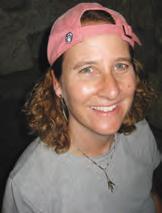
October 5, 2021, in Los Altos, California. Contributed by David Sauerhaft ’82
I first saw Diana in the Reed library in 1980; she was a freshman and I was a junior. She was full of life and very cute. At the start of her soph omore year, Diana came to collect boxes at a mailroom pick-up spot, where I was working. We began talking; and there was definitely a spark.
Diana was down-to-earth and a lot of fun. Everything between us flowed easily, and we developed a deep friendship. We started spending most of our time together, and soon fell into each other’s arms.
That spring we went camping at Oregon Dunes. Our first night, it poured. Rain soaked everything we had brought with us. We hitch hiked to Florence to find a hotel room and found ourselves in a pub enjoying music surrounded by a pack of motorcyclists wearing peace signs on their leather jackets. Diana says that was when she knew we were meant for each other.
At the end of the semester, as I was about to graduate, Diana and I went to Ecola State Beach, and I asked her, “What do you think will happen to us?” Diana said, “I think we will get married.” I don’t think she expected to say that. But it was real, and we embraced with such happiness.
While I began my post-college life, Diana continued her studies in English. She wrote her thesis, “Thou art . . . a metaphoricall God: The Prose Style of John Donne,” with Prof. Gail Berkeley Sherman [English].
After graduating, Diana joined me in New
York City, got a job in publishing, and then attended Columbia Business School, where she earned her MBA. We had a lot of fun living in the city, going to clubs, running in Central Park, and walking Manhattan.
Diana wanted to move back to San Francisco, where she had grown up and attended Lowell High School. She found a job there in banking, and we moved across the country.
We got married in 1989, with many Reed friends in attendance. Diana gave birth to our daughter Julia in 1993 and our son Samuel in 1997. Family formed the center of our lives. Diana loved being a mom, and even as she built her career, which had now shifted to tech, her top priority was spending time with her family and those she loved. Diana had fun playing with Julia and Sam when they were toddlers, and enjoyed going to their soccer and field hockey games, swim and track meets, and theater performances as they got older. She also cared for her parents, helping them live fully as they aged.
Diana made sure we had dinner together every night as a family, and she always welcomed friends and relatives at our table. We built a house in Los Altos, California, which became the hub of our life together. Diana enjoyed working out, reading (two book clubs), and traveling, especially to Kauai.
The relationship that Diana and I began at Reed had become a life with roots and branches woven as one, a deep partnership and love, sustained through good and bad times, with joy and purpose. We shared everything.
In 2015, Diana was diagnosed with ovarian cancer (see Class Notes). Diana received her diagnosis a year after she joined Varian Medical Systems, a leading supplier of radiation oncology equipment. She embraced its mission of building a world without fear of cancer. She spoke about her experience as a patient to her colleagues around the world and to medical students at Stanford and UCSF.
But cancer did not govern Diana’s life. She continued to work (her colleagues appreciated her ability “to get stuff done”). Diana was always passionate about social justice and committed to building a better world. In response to the 2016 election, she co-founded Silicon Valley for America to support Democratic candidates across the country, particularly in local races.
After her diagnosis, we lived with the inten sity of the moment, every day to its fullest. We enjoyed time together at home, talking, cooking, gardening, entertaining, and simply being next to each other. Our children were always close to our hearts. And friendships remained very important, a few from Reed, and many new ones built over the years.
We also traveled both near and far: walking along the California coast, cross country skiing in Yosemite, and seeing plays in Ashland. We explored Greece, biked in Holland, hiked in Swit zerland, and celebrated New Year’s Eve 2020 with
our children on the Champs-Élysées. These were a very rich and wonderful six years.
Diana died on October 5, 2021. We were with our children, looking out onto the garden of our home.
Diana’s life was one of fulfillment and meaning, happiness and adventure, inspira tion and love. Time is only one dimension. Love is also a dimension, every bit as powerful, extending infinitely in every direction. I love Diana with every element of my being. Her love and commitment to me, our children, her friends, and this world is fierce and boundless. Diana’s was and is a wonderful and beautiful life.
January 19, 2022, in Grass Valley, California, from lung cancer.
Rob grew up in Men docino, California. At Reed, he wrote his the sis, “Physiological and Morphological Identifi cation of Neuroactive Substances in the Ner vous System of the Bar nacle,” advised by Prof. Frank Gwilliam [biology 1957–96]. He went on to earn a veterinary degree from the UC Davis School of Veterinary Medicine. He worked at the Woodland Veterinary Hospital until he moved his family to Grass Valley, California, where he was an associate vet at For the Love of Pets for six years and then purchased the hos pital in 2006, practicing there until he retired following his cancer diagnosis in early 2020.
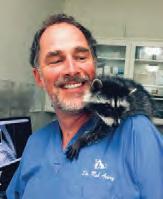
An avid supporter of the local community, Rob served on the Grass Valley School Board and the board of the local nonprofit Bright Futures for Youth for many years. He started a program providing free vet care for the pets of the local homeless population, and donated time and vet care to the Grass Valley Animal Control Shelter. He enjoyed traveling to Alaska and volunteering as a vet for sled dog races, including the Yukon Quest 1,000 Mile Inter national Sled Dog Race.
Rob is survived by his wife of 30 years, Inger Moeller Avery; his two children, Frithjof and Brita Avery ’18 ; his stepmother, Amanda Avery; and his sister, Melinda Avery.
May 25, 2021, in Seattle, Washington, from cardiac arrest.
Sylvia was born in Coronado, California, where her father was a naval officer and her mother a nurse. The fam ily, which moved con stantly, was exceedingly close. Sylvia’s mother enrolled her in dance class at an early age to direct her abundant energy. Sylvia
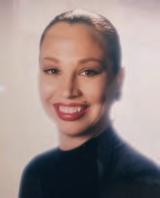
kept up her training through many moves, and, after graduating from high school, she spent sev eral years performing in New York and then Hawaii.
At Reed, she wrote her thesis, “The Multi plicity of Satirists in Shakespeare’s Troilus and Cressida,” advised by Prof. Roger Porter [English 1961–2015]. She always said that she spent her time at Reed, and all the following years, trying to climb out of Plato’s cave. After college, Sylvia returned to Hawaii, worked in a variety of administrative roles, and performed in professional and community theatre. Eventu ally, she moved to Seattle to work in real estate and office management. She directed her stillabundant energy to setting a high but friendly bar for speechmaking at the Ballard branch of Toastmasters International, played bridge, and relished her role as “Auntie Prime” to her sister’s kids, her avowed “two favorite people.”
Sylvia was smart, talented, funny, irreverent, empathetic, and honorable. Her daily goal was to make people laugh and she usually succeeded. She is survived by her sister, Heather Cook: brother-in-law, John DeTurk: and the favorite people, Evan DeTurk and Anna DeTurk. Now she’s dancing with the angels and the kick line is fabulous.
April 22, 2022, in Little Rock, Arkansas, from lung cancer. John grew up in Nashville, Arkansas, where his father owned a furniture store and his mother taught school. After high school, he worked for Senator Dale Bumpers in Washington, D.C.; spent time in Florence, Italy; and traveled through the United States. After a thorough college search, John chose Reed, where he wrote his thesis, “Political Disfranchisement in the PostReconstruction Southern United States,” advised by Prof. Edward Segel [history 1973–2011].
After briefly attending theological seminary at the University of Chicago, John decided to become a lawyer. He graduated with honors from Boston College Law School and returned to Arkansas to clerk for U.S. District Judge Billy Roy Wilson. He became a partner at the Rose Law Firm, with stops at Kutak Rock and James, Carter, and Coulter, before becoming a partner at McMath Woods, where he continued to practice until 2021. A strong advocate for a wide range of civil rights, John was dedicated to protecting the rights of his clients. He received many honors and awards during both his career and years of volunteer service, including Super Lawyers, a designation only awarded to a select number of attorneys in each state. He was elected as a fellow of the College of Labor and Employment Lawyers, and was honored by the Volunteers of Central Arkansas Legal Services as the Pulaski County Pro Bono Attorney of the Year.
John served on many boards and commit tees at First United Methodist Church, where he was a long-time member; and, from 2008 to 2012, he served as pro bono counsel to the
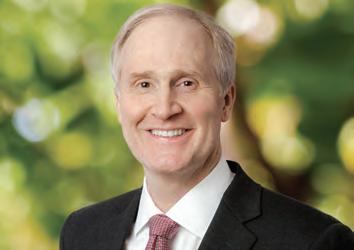
Central Arkansas District of the United Meth odist Church. A dedicated volunteer with the Little Rock School District, John never missed an opportunity to read to a roomful of students or to pitch in where needed.
He is survived by his wife, Laura Lecky Coulter; their son, Jonathan Webb Coulter; brothers Donald Nathan Coulter II and Robert Killian Coulter; stepmother, BG Coulter; and stepsisters Candy Swenke and Tracy Van Y.
April 17, 2022, in Phoenix, Arizona.
Born in Phoenix, Arizona, Tyler attended Madison Simis Elementary and Madison Meadows Middle Schools. He grad uated from Brophy College Preparatory in Phoenix, where he played on the tennis team, contributed to many of the school’s drama productions, and received national recognition for his artwork. He majored in political science at Reed, where he was a contributing author to a corporate law treatise and authored a thesis titled “No Bold, No Foul: An Analysis of Naming and Shaming and Detainee Abuse Prevention in the Iraq War, 2003–2008,” advised by Prof. Darius Rejali [political science 1989–2020]. Tyler’s thesis was later noted at an international symposium at Harvard University and included in the politi cal science curriculum at Reed.
Tyler earned his master brewers certificate from UC Davis, which he pursued to further his career as a brewer following years of working as a craft brewer in Portland. During his time in Portland, he provided brewing system consulting services in Germany, Mexico, and Guatemala, and shared in awards for collabor ative and innovative brews, including a gold medal in the experimental beer category at the Oregon Beer Awards for an Earl Grey barley wine named London Fog.
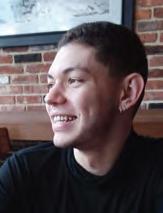
Tyler was an avid brewmaster with a love for the art of craft brewing and spent many years studying the science and art of fermen tation. He was fond of sharing his passion for brewing. He also relished the outdoors and liked hiking with his friends and brother. He
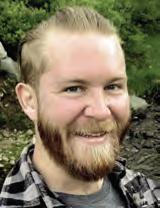
loved video gaming and was skilled at Mine craft, designing several worlds for friends and strangers alike. He enjoyed board and tabletop games, excelled in the kitchen, and in general knew how to make people smile and the world a better place to be. He was awarded his MBA from Arizona State University in May.
Tyler is survived by his parents, Terence and Caryn Thompson, sister, Coree Neumeyer, and brother, Christopher Thompson.
Nathaniel Klein ’18
June 9, 2022, in Los Angeles, California, died unexpectedly in his home.
Born in Maywood, Illinois, Nat was musically inclined from a young age. He played violin, piano, French horn, and mandolin with an uncanny maturity, taught himself to throat sing, and appreciated music from all time peri ods and from all over the world. He graduated from Mount Vernon High where he participated in the speech club. Through his varied inter ests—and in particular his interest in science— Nat had the opportunity to visit many beauti ful cities and countries. His favorite place of all was Portland, Oregon, where he earned a bach elor’s degree in biology at Reed and wrote his thesis, “Retinoic Acid and the Differentiation of Retinal Stem Cells,” advised by Prof. Kara Cerveny [biology].
He worked as a research associate at the University of Arizona in Tucson before moving to Baltimore, where he studied for a short period of time at Johns Hopkins University before moving to Los Angeles to pursue his academic career at UCLA.
Nat loved working with tiny things, from making miniature sculptures to performing surgery on fruit flies and the eyes of fish. As an artist, he painted, sculpted, made digital art, jewelry, and animation, and sketched high fashion design concepts for fun. He was an athlete who ran cross country, played soccer, did archery, and danced ballet and tap. Nat loved animals and was an advocate for them. He found time for the smallest of details. Friends and family will remember his wickedly funny word play, puns, spoonerisms, one-liners, and scathing observations, all delivered in a quiet singsong.
Nat is survived by his parents, C. Elise Klein and Gordon Klein, and his siblings Will, Daisy, and Poppy.
Jeanne Steed ’47, Herbert Miller ’50, George M. Johnson ’52, Alan Duane Ullberg ’54, Tate Minckler ’55, Christopher Colie, ’56, Morris Bol ’58, Maryanna Henkart ’58, David E. Fahrney ’59, Leslie McCune Grace ’59, Michael J. Legge ’72, Andrea L. Prentice ’77, Alison G. Weisner ’81, Fred Russell ’86, Alice Turtledove Meyer ’89, Amy Bliss Enell ’96

By the time Emily Dickinson was 16, she had completed an herbarium, a collection of 424 pressed plants artfully arranged on 66 pages of a hardbound album. Most of the specimens are labeled with their scientific name. Dickinson’s critics have never known quite what to make of this tome. Some argue that its beautiful arrangements precisely prefigure the writing Dickinson will do as an adult, as if cataloging flowers were preparation for creating poems. Others have observed that many girls of Dickinson’s social class would have made something similar as part of their schooling and that the only remarkable thing about this herbarium is that it has survived. In my seminar German Theory 1: Plants and Politics, we learn how botany has always been as much an aesthetic as a scientific enterprise, and we ask why the uniquely interdisciplinary history of this field is important for contemporary debates about environmental devastation and the uncertain future of the planet. What does it mean to study the world around us by archiving samples of it in books? Why is nature something that has to be read as much as it is observed or analyzed?
—PROF. JAN MIESZKOWSKI




3203 SE Woodstock Boulevard Portland, Oregon 97202 -8199
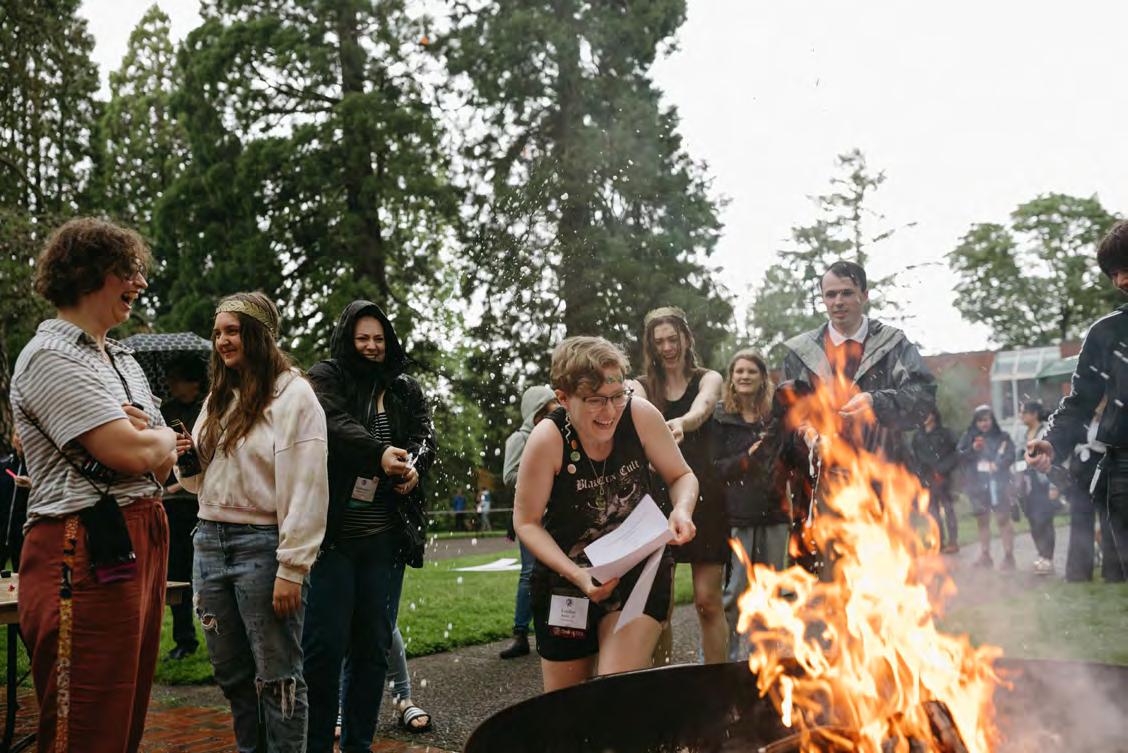
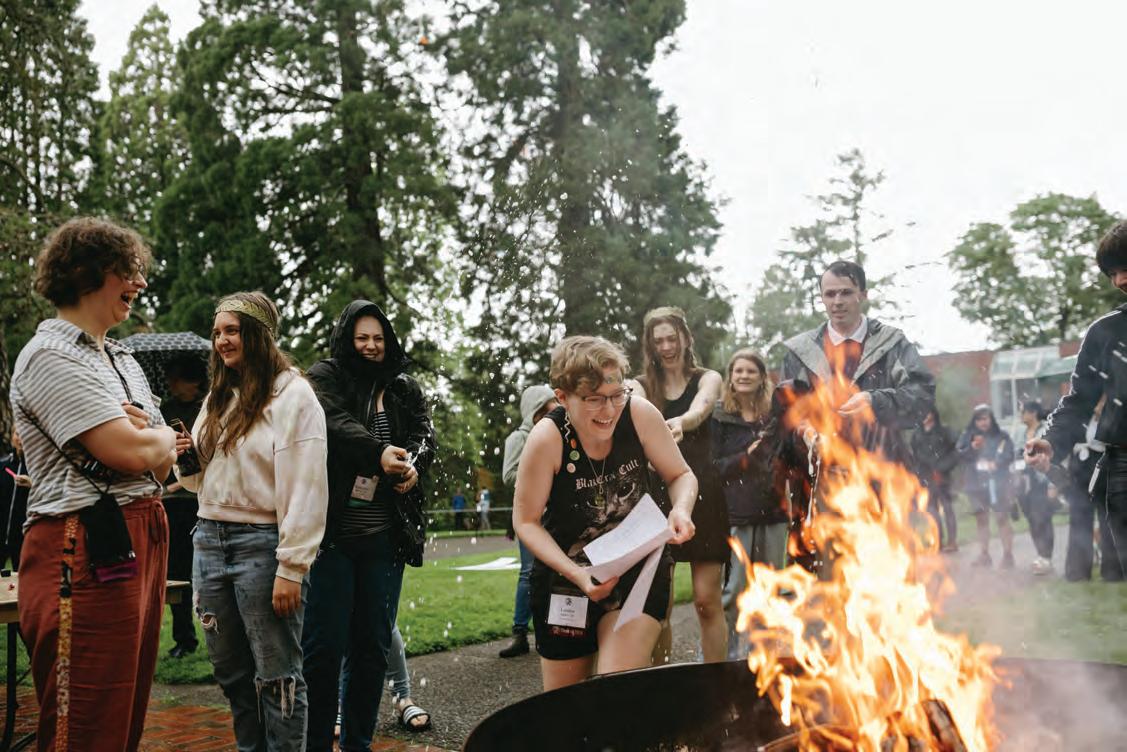 Sure Fire: The class of 2020, whose graduation ceremony was delayed by the pandemic, gathered at last to burn their drafts and walk across the stage during Reunions this past June.
REED COLLEGE
Sure Fire: The class of 2020, whose graduation ceremony was delayed by the pandemic, gathered at last to burn their drafts and walk across the stage during Reunions this past June.
REED COLLEGE